
THE MAGAZINE OF THE CATHOLIC DIOCESE OF KANSAS CITY-ST. JOSEPH
June/July 2024 ON THE WAY Where are you going? FATHERHOOD Dad’s Matter at Parkville Women’s Clinic SUMMER CAMP Conversión y camaradería Honoring the True Presence of Jesus Christ in the Eucharist Corpus Christi Celebrating
kcsjcatholic.org

DIOCESE SPECIAL FOR CATHOLIC PARISHIONERS UP TO $2,500 OFF MOVING COSTS! CALL TODAY TO SCHEDULE A TOUR! 816.653.4234 1000 E 68th St, Kansas City, MO 64131 Sponsored by KC - St. Joseph Diocese Discover a vibrant culture and carefree living at our locally owned community, o ering independent living, assisted living and memory care. Enjoy chef-prepared culinary experiences, engaging activities, and panoramic views of Kansas City—all within the security of a privately gated community. ST. ANTHONY’S ADVERTISEMENT
The magazine of the Catholic Diocese of Kansas City-St. Joseph
June/July 2024 VOL. 4 | ISSUE 4
Bishop James V. Johnston, Jr. PUBLISHER
Ashlie Hand EDITOR
Jenny Pomicter GRAPHIC DESIGNER
To submit story ideas and news, send emails to hand@diocesekcsj.org

Catholic Key (ISSN 2769-2353, USPS 024-190) is a membership publication of the Diocese of Kansas City-St. Joseph, published bimonthly (Feb/ Mar, Apr/May, Jun/Jul, Aug/Sep, Oct/Nov, Dec/Jan) by the Diocese of Kansas City-St. Joseph, The Catholic Center, 20 W. Ninth St., Kansas City, MO 64105. Periodicals Postage Paid at Kansas City, MO and at additional mailing offices. POSTMASTER: Send address changes to Catholic Key, The Catholic Center, 20 W. Ninth St., Kansas City, MO 64105. ©2024 Catholic Key, Diocese of Kansas CitySt. Joseph.
ON THE COVER:
The June 11, 2023 Corpus Christi procession from Holy Cross Parish to St. Anthony Parish in Kansas City.
Photo by Christy Gruenbaum.
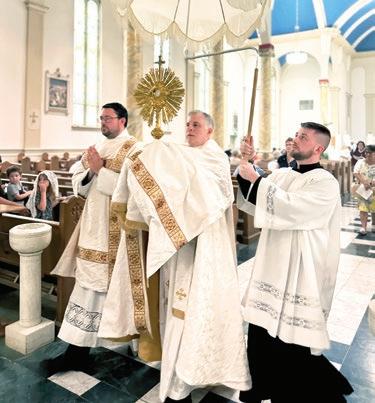
COVER
STORY
Celebrating Corpus Christi | Sara Kraft
The feast day of Corpus Christi reinforces the great mystery of Christ’s True Presence in the Eucharist. One way our diocese manifests our Faith is through Corpus Christi Eucharistic processions. During these processions, the Body of Christ is displayed in a monstrance and marched down the streets of a city. Throughout the procession, the faithful follow Jesus in pilgrimage. Attending adoration or simply stopping by a church to say hello to Jesus is a great way to profess our Faith in Jesus, who is really and truly present in the Blessed Sacrament.
4 On the Way: Where are you going? | Bishop James Johnston
The Christian life entails following Jesus in our own unique lives, wherever he is going.

Marty Denzer is long-time writer in residence for the Catholic Key.
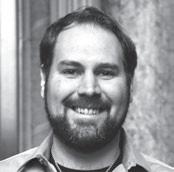
Brad Horn leads the Office of Youth Ministry for the Diocese of Kansas City-St. Joseph.
6
Camp Savio: Keeping the flame alive | Brad Horn
Youth camps serve to ignite the flame of love for Jesus in the hearts of the youth. The challenge, however, is sustaining this flame after camp concludes.
8
House of God | St. James Parish, St. Joseph | Ashlie Hand and Cory Thomason
St. James Parish, located at 5818 Pryor Ave. in St. Joseph, was the first parish to be established in south St. Joseph in 1900.
20 To Serve and Lift | Our Lady of Hope Society | Kylie Helmer
This spring, Catholic Charities of Kansas City-St. Joseph announced the inauguration of the Our Lady of Hope Society.
23
Humble chapel, mighty mystery | Allison Vrooman
Celebrating its 25th anniversary, the St. Therese Adoration Chapel considers itself “The humble chapel that hosts a mighty ministry.”
28
Parkville Women’s Clinic — teaching, supporting and celebrating parenthood | Marty Denzer
The Fatherhood Program at Parkville Women’s Clinic was “born” in 2021. Since then, 528 dads have been served, and 12 men serve as mentors, operating under the slogan, “Dads Matter.”
31 Military Veteran and Family Outreach Ministry | Allison Vrooman
The Military Veteran and Family Outreach Ministry (MOM) is actively present in the parish and local community, fostering a space for individuals and families with similar experiences to connect and thrive.
32 “ Opus Dei ” (Work of God) is a universal call to holiness | Marty Denzer Almost a century ago, in 1928, a Spanish priest, Josemaria Escriva, had a vision of “Opus Dei” (Work of God). He “saw” a way for Catholics to learn how to answer the universal call to holiness.
En Español
Allison Vrooman is communications specialist for the Diocese of Kansas City-St. Joseph. 12
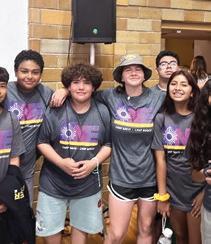
25 Conversión y camaradería: ¡Los jóvenes latinos necesitan un verano católico! | Por Leyden Rovelo-Krull
26
En el Camino | ¿Adónde vas? | Por Obispo Johnston
33
El “Opus Dei” (Obra de Dios) es una llamada universal a la santidad | Por Marty Denzer

Sara Kraft is a freelance writer in St. Joseph, Missouri.
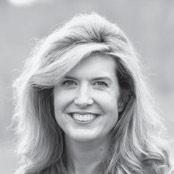
Kylie Helmer is a volunteer writer for Catholic Charities KCSJ.

3
WHERE ARE YOU GOING?
JESUS THEN SAID TO HIS DISCIPLES: ‘IF A MAN WISHES TO COME AFTER ME, HE MUST DENY HIS VERY SELF, TAKE UP HIS CROSS, AND BEGIN TO FOLLOW IN MY FOOTSTEPS. WHOEVER WOULD SAVE HIS LIFE WILL LOSE IT, BUT WHOEVER LOSES HIS LIFE FOR MY SAKE WILL FIND IT.’”
— MATTHEW 16:24-25
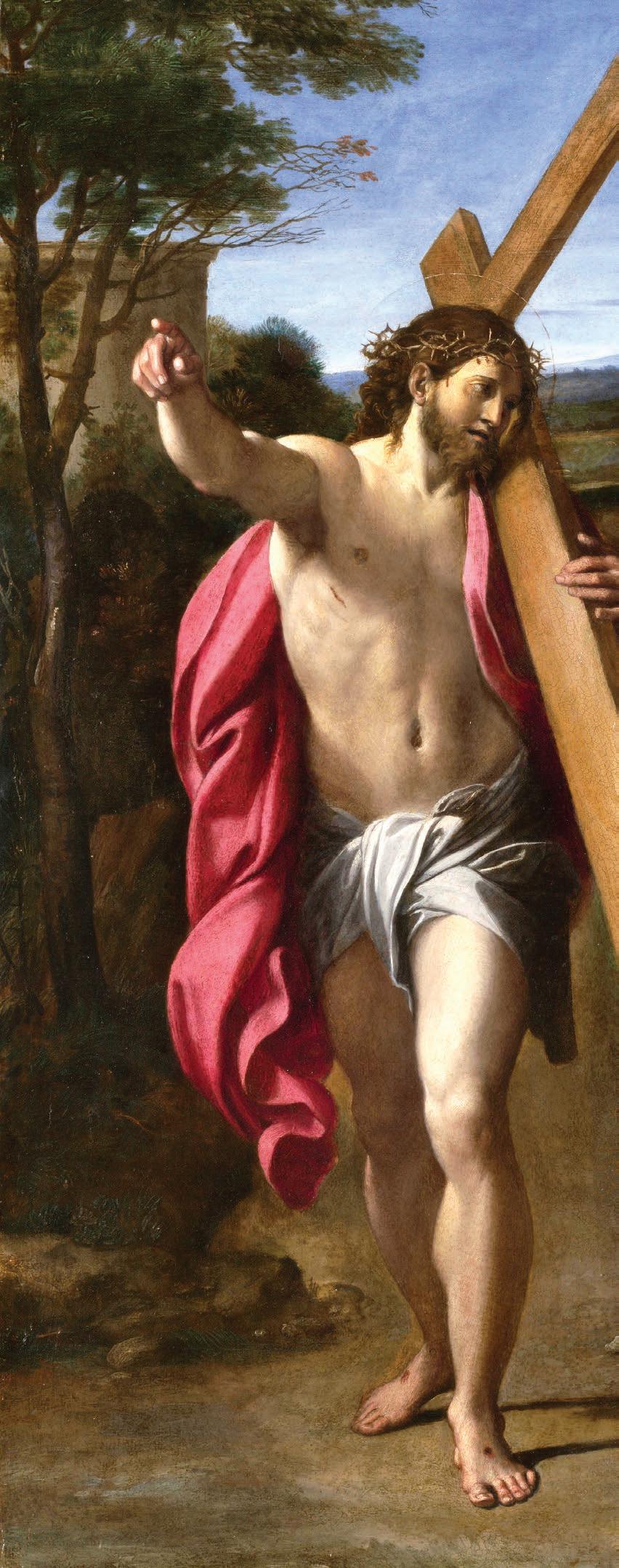
on the way Annibale Carracci, Public domain Catholic Key • June/July 2024 • catholickey.org 4

From the Bishop Bishop James V. Johnston, Jr. is the seventh bishop of the Diocese of Kansas City-St. Joseph
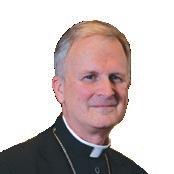
There is a well-known story of the “Quo Vadis” tradition that, during the Roman Emperor Nero’s Christian persecution in the first century, Saint Peter was fleeing Rome along the Appian Way, perhaps out of fear, or maybe out of a desire to make sure he could fulfill his duties for the infant Church as “the Rock,” when he encountered Jesus heading the other way, toward Rome. Surprised, Peter asks Jesus, “ Quo vadis, Domine,” or “Lord, where are you going?” To which Jesus replies, “I am going to Rome to be crucified,” and then disappears. At which, Peter then turns around to face his martyrdom, being crucified upside down, as tradition has it. If you visit Rome today, you will find a church along the Appian Way where the encounter is said to have occurred.
For a disciple, it is good to ponder the story as it relates to our own journey. One could even make the question a daily prayer for meditation, asking Jesus, “Lord, where are you going today?” The Christian life entails following Jesus in our own unique lives, wherever he is going. Too often we can fall prey to an overly independent attitude in which we set out in a direction and ask the Lord to follow us!
Every year our Vocation Office offers a Quo Vadis retreat for young men who are open to discerning a call to the priesthood. It is a time to put one’s own plans aside and ask the same question that Saint Peter is said to have asked Jesus, “Where are you going?” The implication being that the answer has great bearing on where I need to be going too. The same holds true for all Christians.
The story also illuminates the tendency to, like Peter, run away from the cross and sacrifice. Before Jesus’ Passion, Peter tried to dissuade Jesus from going to Jerusalem, because Jesus had shared with them that he would be handed over and put to death. Jesus rebuked Peter on that occasion. Perhaps Peter was reminded of that again when he encountered Jesus on the Appian Way. It is something we all need reminding of — the temptation to give into fear or what seems most expedient, rather than follow Jesus, his Gospel and the teaching of the Church.
If we are disciples of Jesus, we must follow him and not the other way around. And to do that, we must make Saint Peter’s question our own, “Where are you going, Lord?”
5
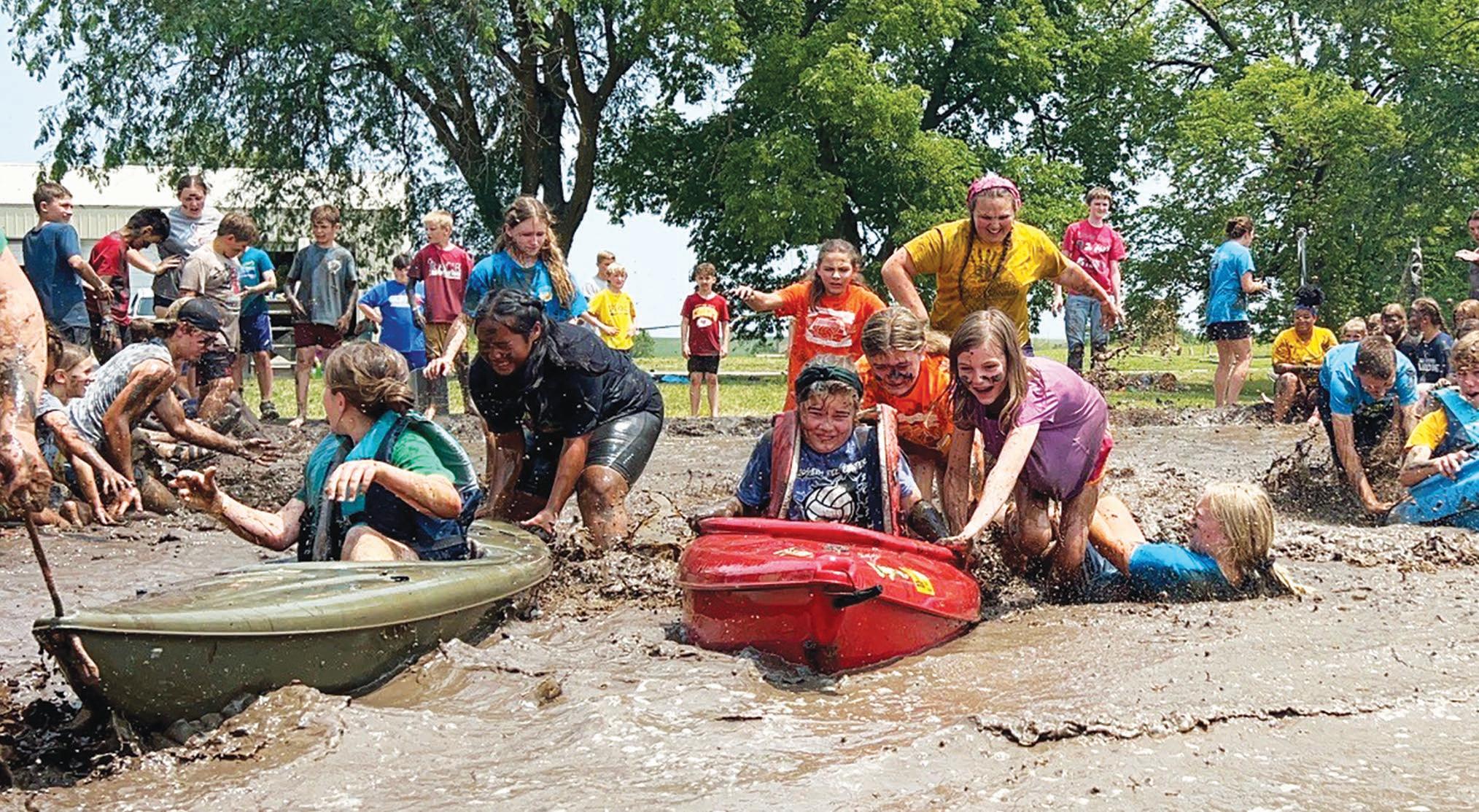
CAMP SAVIO KEEPING THE FLAME ALIVE CAMP SAVIO CAMP SAVIO
For the past several decades, faith-based youth camps have become a fundamental aspect in youth ministry for young people to encounter Jesus Christ outside their normal daily life. These personal encounters with Christ are vital for life-changing conversions. Youth camps serve to ignite the flame of love for Jesus in the hearts of the youth. The challenge, however, is sustaining this flame after camp concludes.
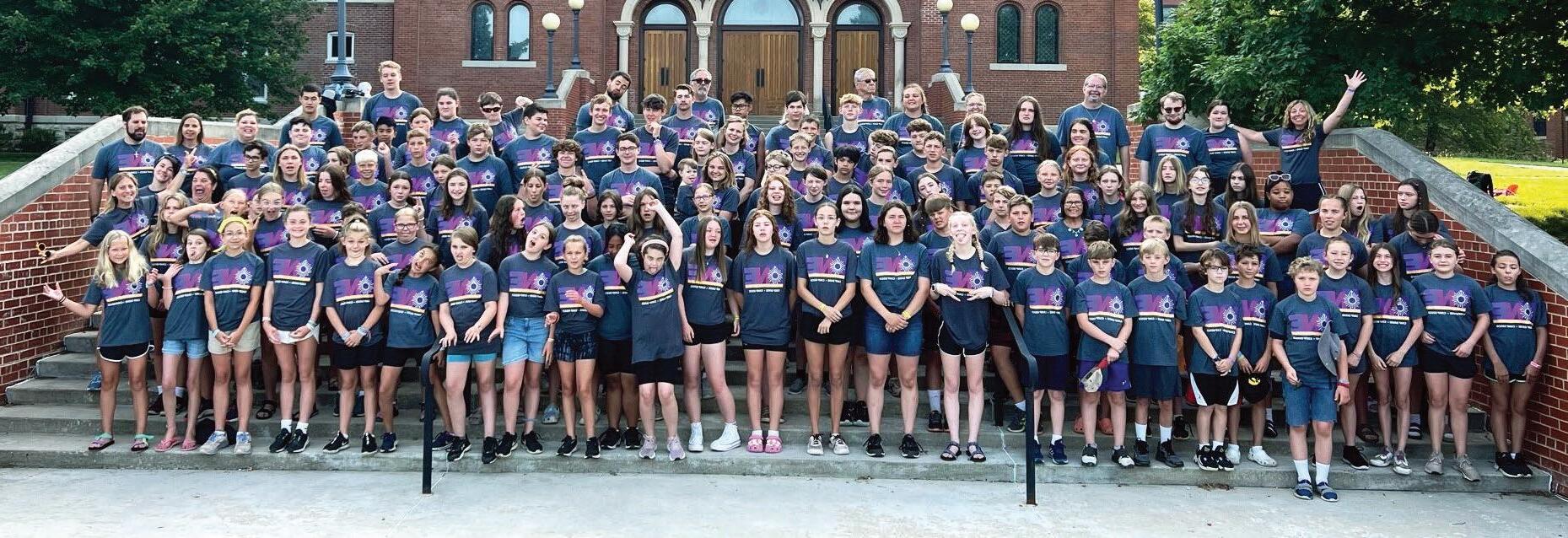
feature Catholic Key • June/July 2024 • catholickey.org 6
Story and photos by Brad Horn, director of youth ministry
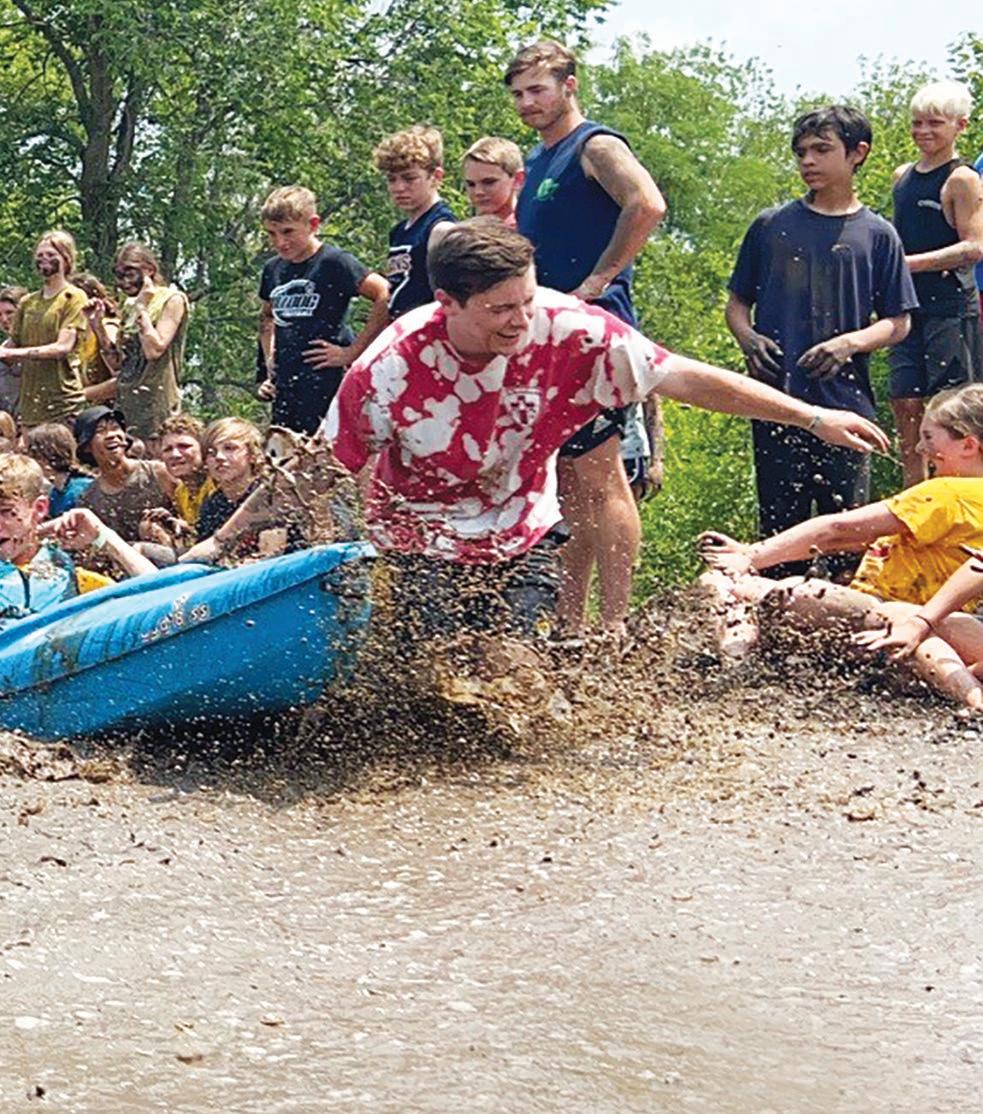
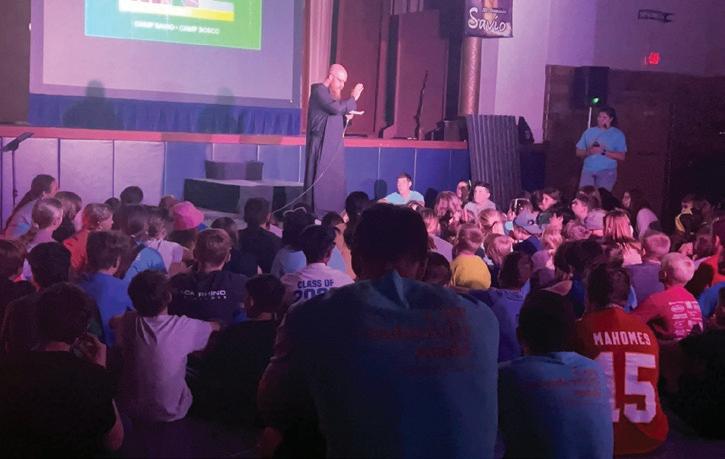
Following a powerful experience at camp, a young person needs guidance when they return to their everyday life to keep the flame alive; otherwise, like a piece of flash paper, it bursts into flame with excitement but is quickly extinguished.
Since 2011, Camp Savio, inspired by the spirituality and patronage of Saint Dominic Savio, has pursued this endeavor by fostering a spirit of community and fellowship among the middle school parish youth ministries of the Diocese of Kansas City-St. Joseph. However, the reputation of Camp Savio grew rapidly, and it became essential to expand our resources. For years, Maur Hill Mount Academy in Atchison, Kansas, graciously opened their campus to Camp Savio while a permanent site for camp could be found. We sought not only a permanent place to host camp within the diocese, but a place Camp Savio could call home.
This home was finally found last summer when Camp Savio partnered with the Benedictine monks at Conception Abbey Monastery. The remote location and serene beauty of the monastery allows the campers to break free from the distractions of their daily lives and enjoy themselves all while growing in deeper relationship with God. Celebrating Mass with the monks and hosting our large adoration session in the basilica are now highlights of Camp Savio. It is a beautiful sight beholding 100 youth sitting before the Lord with the final rays of daylight falling upon the monstrance as their praises echo throughout the sanctuary.
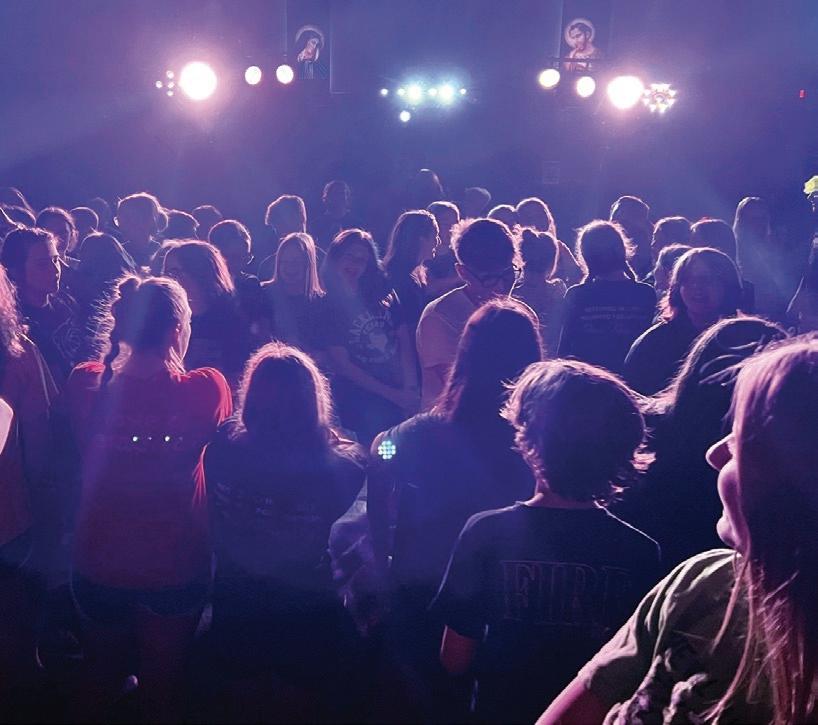
I’M NOT ABLE TO DO GREAT THINGS, BUT I WANT TO DO EVERYTHING, EVEN THE SMALLEST THINGS, FOR THE GREATER GLORY OF GOD.”
— SAINT DOMINIC SAVIO
Additionally, the Benedictine motto ora et labora, or “work and pray,” was met with enthusiasm in the hearts of young campers seeking to "play hard, pray harder,” the motto of Camp Savio. It proved to be a perfect match last summer as the monks played hard with our campers leaving them with fond memories ranging from Father Etienne celebrating many of our Masses and enduring the “Hot Seat,” where we give campers an open mic to ask a priest any question they desire, to Brother Luke creating a tower out of recycled yogurt cups, inspiring an impromptu yogurt cup building competition, to Brother Gabriel helping dig the mud pit then immediately belly flopping into the muddy water. Looking on in astonishment and bewilderment, the reaction from the campers not only demonstrated how invaluable the monks are to the camper experience but also the impact the campers have on the Benedictine community.
“What often seemed like inconsequential interactions to us were monumental for the campers,” observes Father Pachomius Meade. “And we benefit from their awe, energy and faith as well. It was very little effort to have a huge impact on our local church.”
While it would be tempting to think that our campers have all the fun at Savio, being a camp staffer has some amazing perks of its own. One of the most valuable benefits of being a staff member of Camp Savio is the investment of faith formation received. The Benedictine monks have greatly influenced our camp staff formation through their hospitable witness of treating every camper like Christ. Likewise, the prayerful atmosphere empowers our staff to be attentive to the movements of the Holy Spirit and equips them to accompany our campers in the community of faith.
As noted by Father Etienne Huard, “When enlivened in a community, supported, and encouraged with others, faith grows and spreads. At Camp Savio, the young see that there is a vibrant and healthy community that shares the Faith, that encourages them and strengthens them. At camp, the Faith grows!”
The future is certainly bright for youth ministry in the diocese. Through the cooperative relationship of Camp Savio and Conception Abbey, we can ignite our youth through the meaningful moments of the camp experience and then fan that flame into a life-changing relationship with Christ.

7
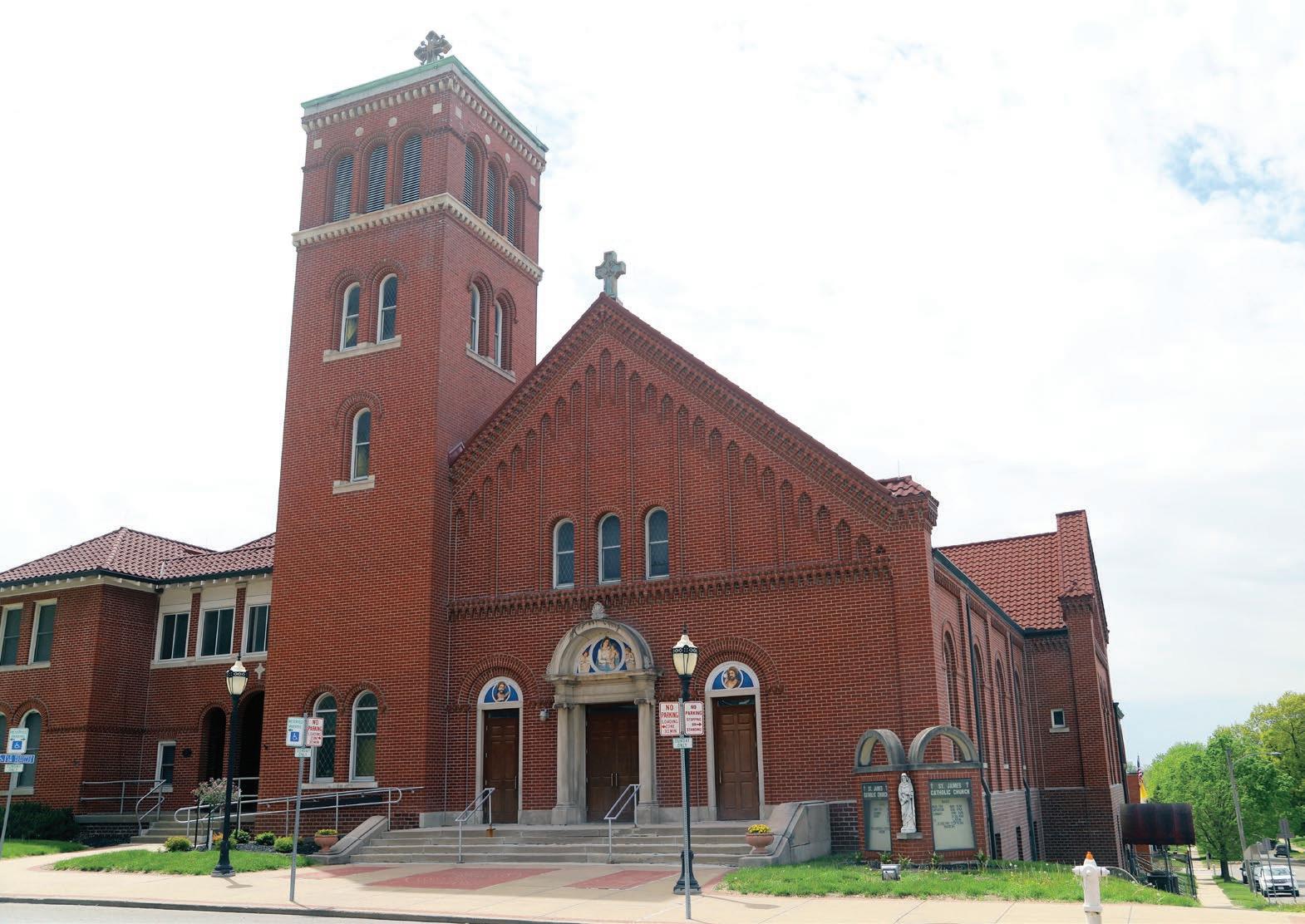
House of God
St. James Parish, St. Joseph
By Ashlie Hand
Photos by Cory Thomason and Megan Marley
St. James Parish, located at 5818 Pryor Ave. in St. Joseph, was the first parish to be established in south St. Joseph in 1900. A parish school opened in 1909, and the current church was dedicated in 1913.
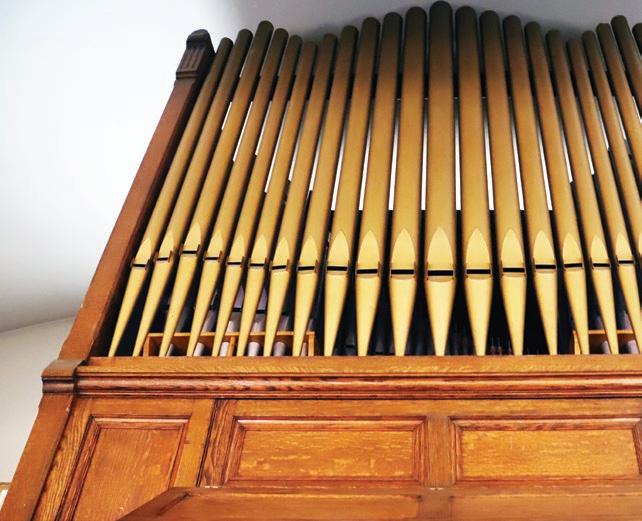

The architecture of St. James Church and bell tower is Italianate Romanesque, a style used in Northern Italy around 1400 AD. The exterior is of St. Joseph pressed brick, trimmed with stone and with a tile roof. Above the doors are three panels of colored terra cotta, showing the Blessed Mother and Christ Child and two angels in the center panel. St. James the Greater and St. James the Lesser are portrayed on the right and left respectively. It is said to have been the first use of polychromatic terra cotta in St. Joseph. (This Far by Faith, Vol. II)
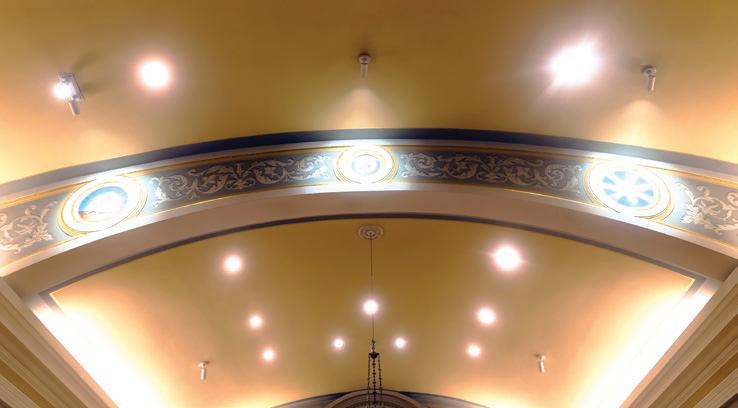
Restorations over the years have involved roof repairs, updated painting (including these vignettes depicting the Father, Son and Holy Spirit) and the installation of oak wood floors, all intended to bring back a warm, traditional look that echoed the churches of the 1940s, ’50s and ’60s.
photo essay
Catholic Key • June/July 2024 • catholickey.org 8
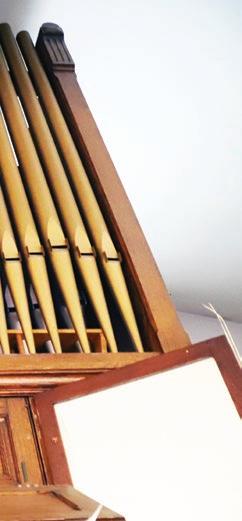
In 1919, a Kilgin organ, made in St. Louis, was installed. It features 459 pipes situated in eight ranks.
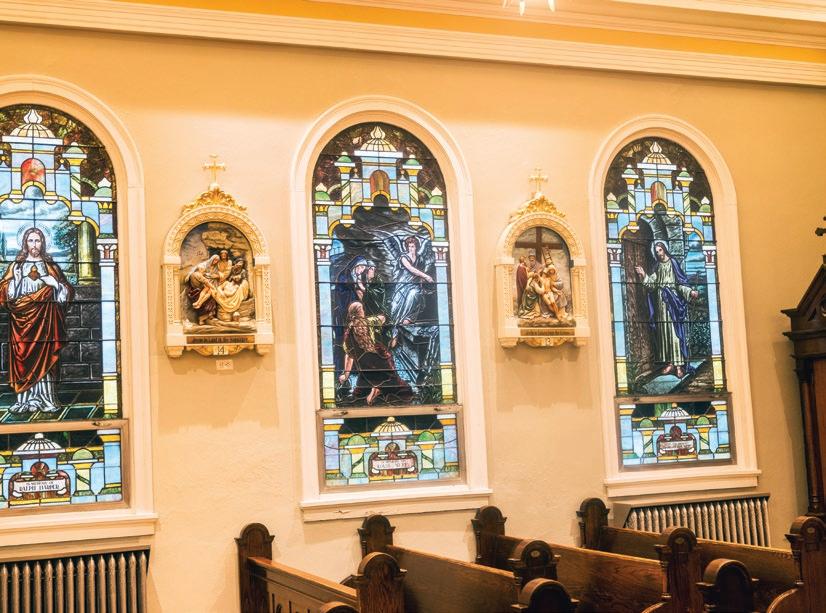
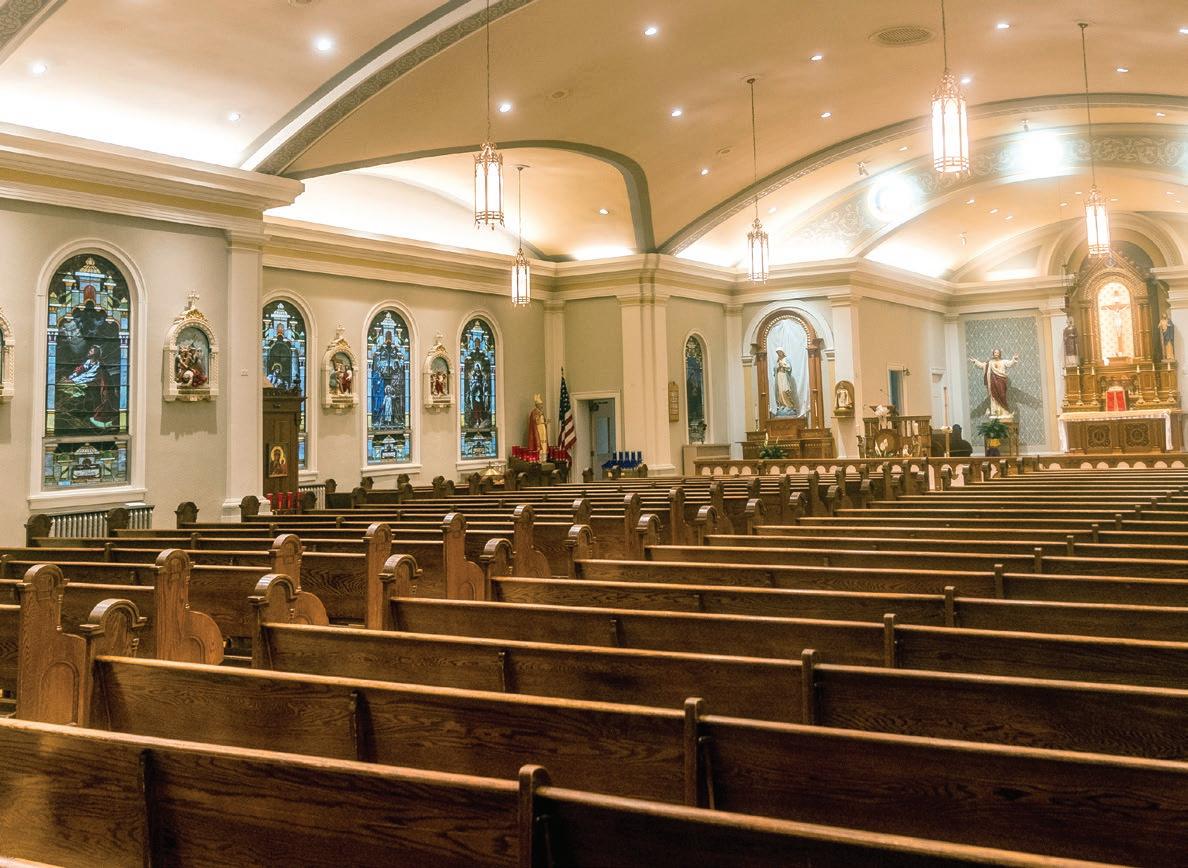
Stained-glass windows line each side of the main sanctuary of the church, installed when the current church was built in 1913 along with the pews still in use today. A group of St. James parishioners have taken on an ambitious project to research and tell the stories of each of the donors named on the stained-glass windows throughout the church.
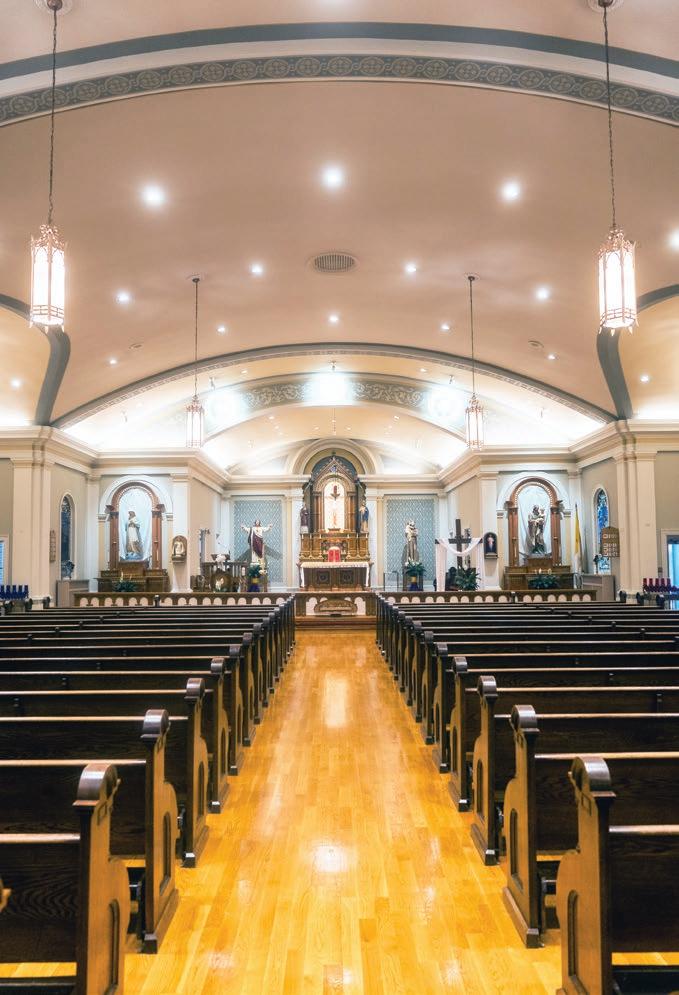
The interior of St. James Church is designed in a neoclassical style, which adheres to the aesthetic principles found in the art and literature of Ancient Greece and Rome. This style of architecture is most noted for its domed ceilings supported by thick walls and arched doorways. (This Far by Faith, Vol. I)
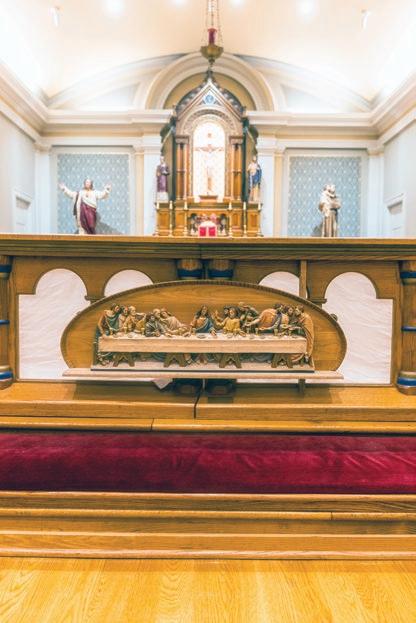
The high altar was moved to St. James Church from Conception Abbey in the 1960s, while the communion rail with its carved depiction of the Last Supper are more modern additions, both added to the church in the last 25 years.
Visit
See more photos and a video tour at catholickey.org 9
St. James Catholic Church online at saintjamescatholic.church
‘Fountains of Faith’ brings together pastoral musicians for networking and growth
The National Association of Pastoral Musicians (NPM) fosters the art of musical liturgy. The members of NPM serve the Catholic Church in the United States as musicians, clergy, liturgists and other leaders of prayer.
By Ashlie Hand
Photos submitted by National Association of Pastoral Musicians
This year, the association will host its 47th annual national convention in Kansas City July 8-11, aptly titled “Fountains of Faith.”
Danny Baker, director of music and liturgy at St. James Parish in Liberty, is the Region 9 representative, serving the Missouri, Kansas, Iowa and Nebraska members, and he is also serving as chair of this year’s convention.
“Together with the help of a local core team, we have planned what is sure to be an exciting convention,” he said.
Who should attend? This convention is open to anyone, but especially those who serve the Church with their gifts of music. This includes volunteer choir members, cantors, organists, pianists, instrumentalists, hand bell ringers, full-time and part-time music directors and liturgists, just to name a few. This year offers a specific track for clergy, too.
What are the top three reasons you would encourage local pastoral musicians to attend? CONVENIENCE: For many, this will be a once in a lifetime opportunity. Often conventions like these are too far away and people can't take time off work or it's not financially feasible. With it being here in our own backyard, it makes attending a lot easier. NETWORKING: This is the best way to meet other musicians who are ministering in their own churches, share
stories, and brainstorm what is working and what is not working in your ministry.
GROWTH: As musicians, we must be lifelong learners. Continually finding ways to grow not only musically, but spiritually. This convention offers practical ways to grow in musical techniques and knowledge, but also offers spiritual growth and nourishment, reflecting on scripture and sacraments.
Learn more about the National Association of Pastoral Musicians at npm.org.
Gathering together as one body in Christ as musicians is essential to what we do every week, Sunday after Sunday. The opportunity to grow together at these conventions can help you feel motivated and offer a sense of refreshment. It allows young musicians to create lasting friendships with mentors. It offers a multitude of resources to take back to your own parish.
What are you most looking forward to with this year’s convention? I'm most excited for the convention Mass at the Cathedral of the Immaculate Conception. Giving thanks and praise to God and receiving the Eucharist with more than 600 musicians is an experience like no other.
What do you hope attendees take away from this year’s convention? I hope attendees leave with a sense of renewal in their call to serve God and the Church. Filled with the fire of the Holy Spirit and returning home to their parishes and sharing their experience with others. Pope Francis said in 2019 about the importance of music in the liturgy and those who serve,"Sacred Music helps hold Christian history together. Gregorian chant, polyphony and popular and contemporary music resonate in the liturgy, bringing the past and the present generation together in praising God." Pastoral musicians have the awesome responsibility to encourage the faithful to pray and sing with full, conscious and active participation in the liturgy. This is at the core of who NPM is and why it exists — to foster the art of musical liturgy.
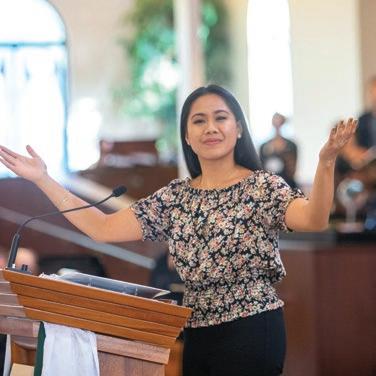
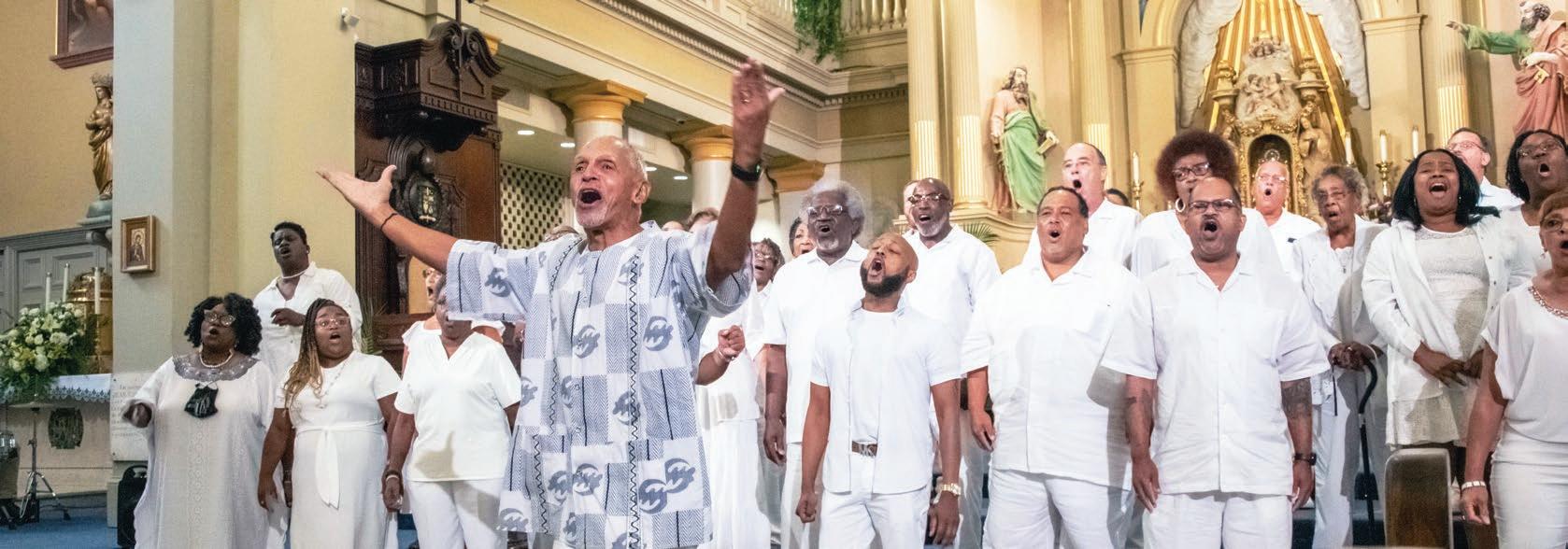
feature
Catholic Key • June/July 2024 • catholickey.org 10
From liberty To liberation:
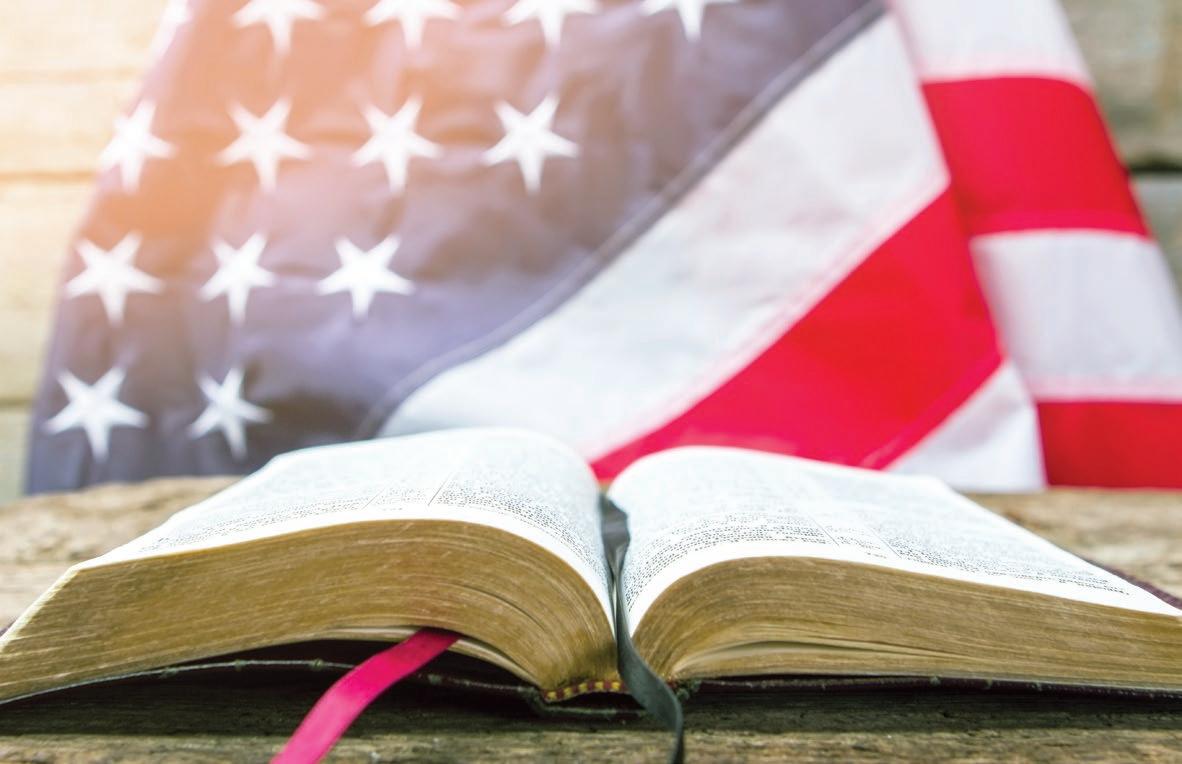
RECONCILING AMERICAN AUTONOMY WITH CATHOLIC SPIRITUAL FREEDOM
Americans enjoy a unique form of freedom, a cherished privilege envied by many around the world.
As the Declaration of Independence famously states, we have certain “unalienable rights” to “life, liberty and the pursuit of happiness.” This American understanding of freedom reflects a commitment to creating a society where people can live autonomously, pursue their goals, and contribute to the common good. However, our American perspective may sometimes cloud our understanding of the Church’s teachings on freedom in the theological sense. What does it truly mean to be free in the Catholic context?
 Marc Cardaronella is the director of the Office of Catechesis and Faith Formation.
Marc Cardaronella is the director of the Office of Catechesis and Faith Formation.
The Catechism of the Catholic Church (1733) states, “The more one does what is good, the freer one becomes. There is no true freedom except in the service of what is good and just. The choice to disobey and do evil is an abuse of freedom and leads to ‘the slavery of sin.’”
In the Old Testament, freedom meant liberation from bondage or subjugation by for-
is the power to choose the good. This power is cultivated through repeated deliberate acts that shape character and conscience.
eign powers. When God rescued Israel from Egypt, they gained autonomy and the ability to pursue their own interests, free from enslavement and oppression. Yet, Israel’s freedom was more than political deliverance; it was redemption through their covenant relationship with God, transforming them into his chosen people. This covenant also entailed responsibilities akin to familial obligations, which, if violated, could lead to the loss of that autonomy.
In the New Testament, this idea of freedom takes on a deeper theological significance. Christ liberates us from the enslavement of sin to enjoy the rights and blessings of God’s family under the New Covenant. This also comes with responsibilities.
Here’s the rub. Our American understanding of freedom aligns more closely with the concept of liberty — the ability to choose one thing or the other as you see fit. Specifically, personal liberty pertains to making choices about how we live without interference. Conversely, in the Catholic perspective, freedom is not merely the ability to act as one chooses. Instead, freedom
Think about playing the piano. Anyone can bang on the keys and make noise. However, only someone with years of serious, deliberate practice has the power or freedom to play beautiful music. Similarly, the more you deliberately choose the good, the more freedom you have. For instance, a person who consistently chooses to be honest is free to speak the truth, even in difficult situations. On the other hand, a liar is less free to tell the truth. He’s lost that power. Sin may be the exercise of greater liberty, but it results in less freedom. That’s how sin results in slavery.
At times, we may perceive the Church’s teachings as restrictive, and that makes us want to turn away from God to follow our own path. However, these constraints are intended to lead us toward a deeper spiritual freedom — the freedom to love unselfishly and without restraint. Everything the Church does is in service of this authentic freedom, which transcends mere liberty and fosters the flourishing of the human person.
Self-determination is ingrained in our being. Americans are hard-wired to crave autonomy. Tensions arise when these desires conflict with the moral demands of the Church. Yet, it’s through adherence to these demands that we attain the true freedom promised in Scripture: “So if the Son makes you free, you are free indeed.” (Jn 8:36) Free to live authentically human lives. Free from the sin that gives fleeting gratification but ultimately ensnares in bondage.
catechism corner
Getty Images/Denisfilm
11
By Sara Kraft
Celebrating
Honoring the True Presence of Jesus Christ in the Eucharist Corpus Christi
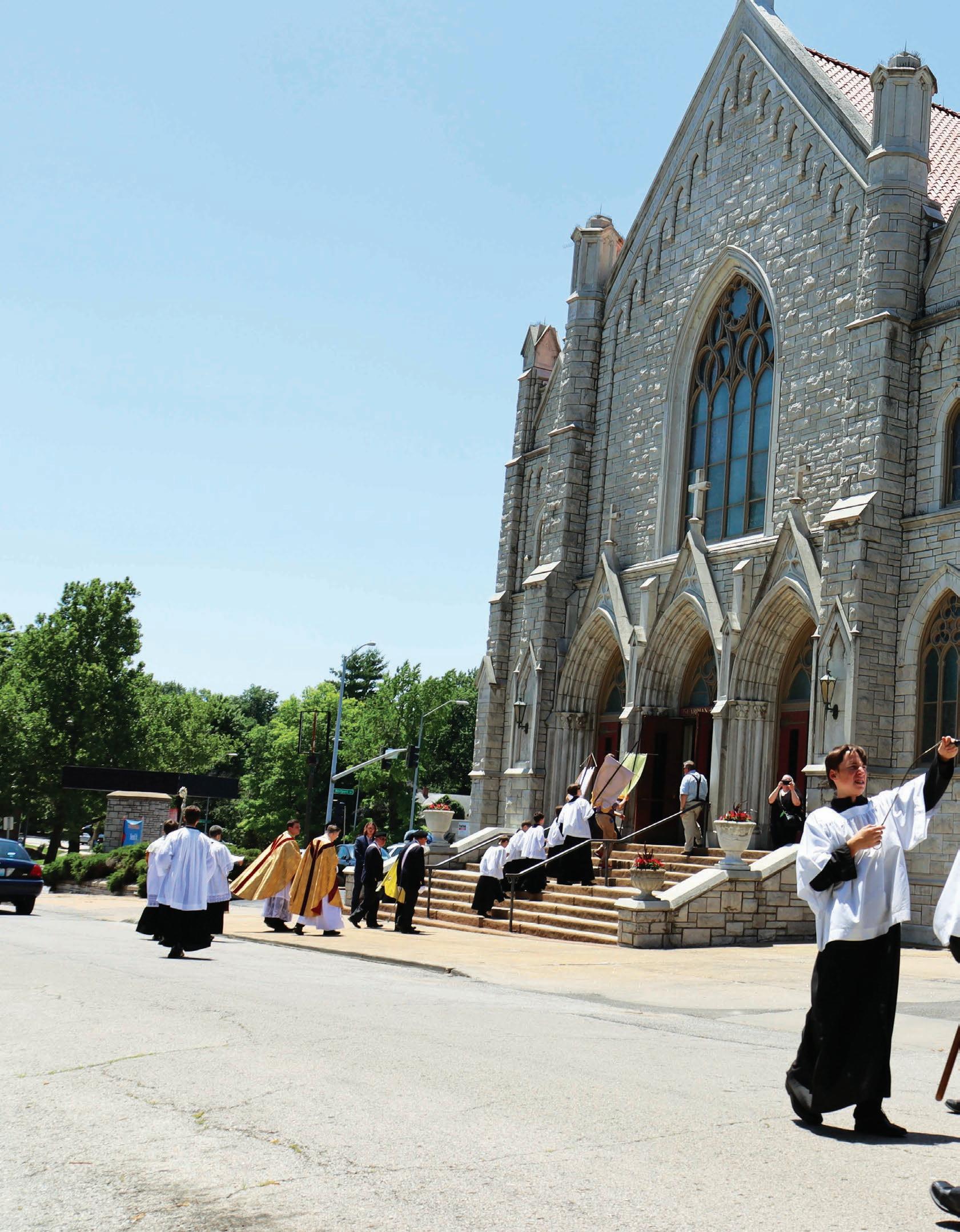
What is Corpus Christi? In Latin, Corpus Christi means “Body of Christ.” As Bishop Johnston explained, “Corpus Christi is a Solemnity set aside for the Liturgical celebration of the gift of the Body and Blood of Christ in the Eucharist.” In other words, Corpus Christi is a holiday in which Catholics celebrate their Faith, joy and belief in the True Presence of Jesus in the Body and Blood of Christ in the Eucharist. In the United States, Corpus Christi is celebrated as a solemnity (or feast day of the highest rank) two Sundays after Pentecost. This year, Corpus Christi is observed on Sunday, June 2.
cover story
Catholic Key • June/July 2024 • catholickey.org 12
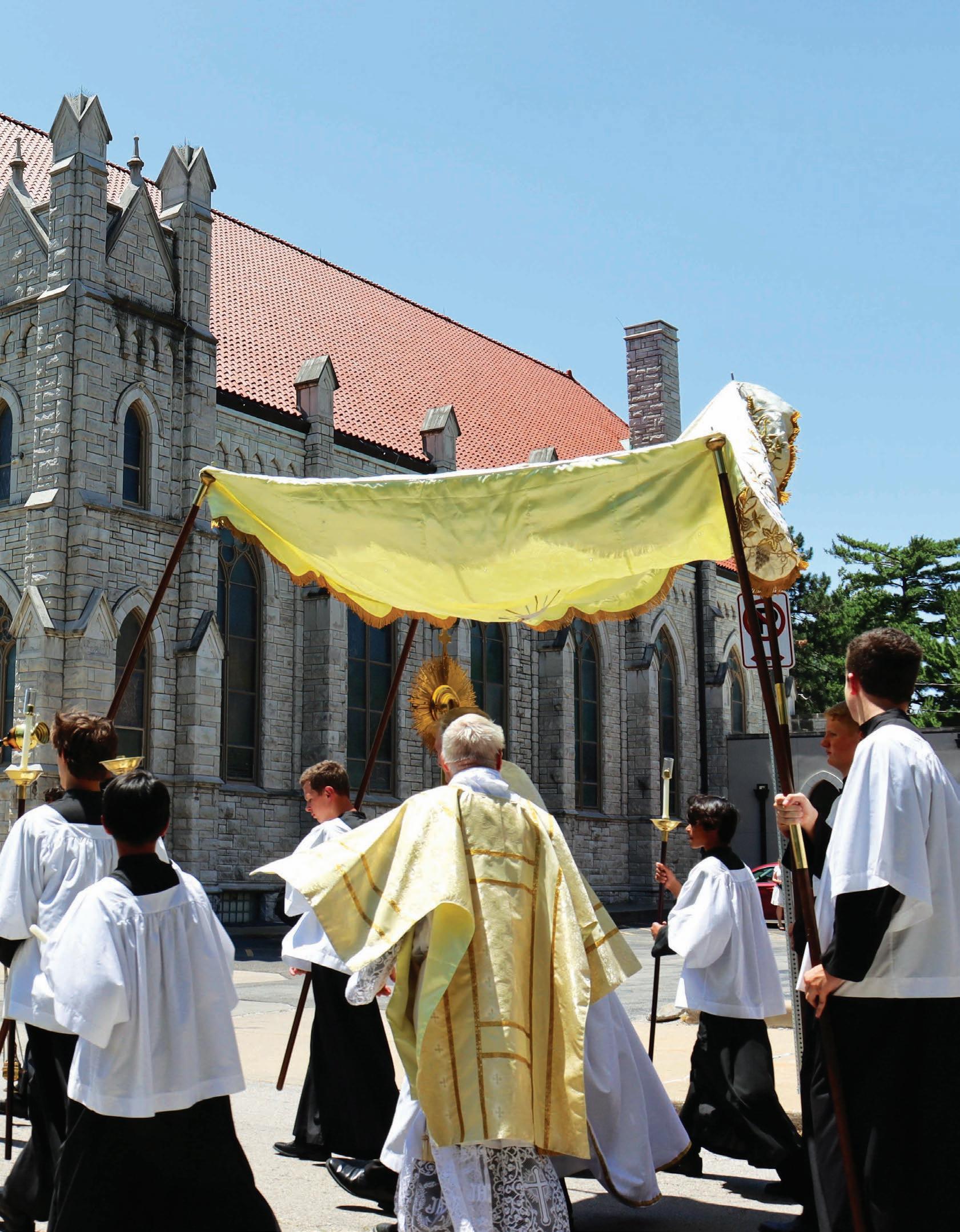 2022 Corpus Christi procession to Guardian Angels Parish, Kansas City.
2022 Corpus Christi procession to Guardian Angels Parish, Kansas City.
13
Photo by Megan Marley.
As Catholics, we believe that during Mass, the ordinary bread and wine miraculously, through the actions of the priest, truly become the Body and Blood of Christ. We call this transubstantiation. Celebrating Corpus Christi reinforces the great mystery of Christ’s True Presence in the Eucharist. “Of course, we celebrate this gift every time the Mass is offered, but this is a time of special, more intense focus on this gift which developed in the Church over the centuries. It often includes public processions which show honor and love for the Eucharistic Lord,” continued Bishop Johnston.
The solemnity finds its origins nearly 800 years ago in the visions of Saint Juliana of Cornillon, a Belgian nun. Pope Urban IV established this feast for the entire Church in 1264 as a way to honor the Eucharist more intentionally than on other days.
One way our diocese manifests our Faith is through Corpus Christi Eucharistic processions. During these processions, the Body of Christ is displayed in a monstrance and marched down the streets of a city. Throughout the procession, the faithful follow Je -
“A procession ‘calls to mind walking with Jesus down the road. It’s a symbol of how we are called to walk with Jesus on the road to eternity. God is with us on all the curves and bumps of the road as we move towards Christ.’”
— Father Jonathan Davis
sus in pilgrimage. They sing, chant and pray. Traditionally, children who have just made their First Communion wear their First Communion outfits again and throw flowers in Jesus’ path. Banners, candles and sometimes even statues are carried to show honor to our Lord.
In 2023, two such processions were hosted by the Diocese of Kansas City-St. Joseph one in Kansas City and another in St. Joseph. In St. Joseph, Father Kenneth Riley led several hundred people in a procession that traveled nine blocks from the Cathedral of St. Joseph to the Pro-Life Shrine of the Immaculate Conception (formerly Immaculate Conception Parish)
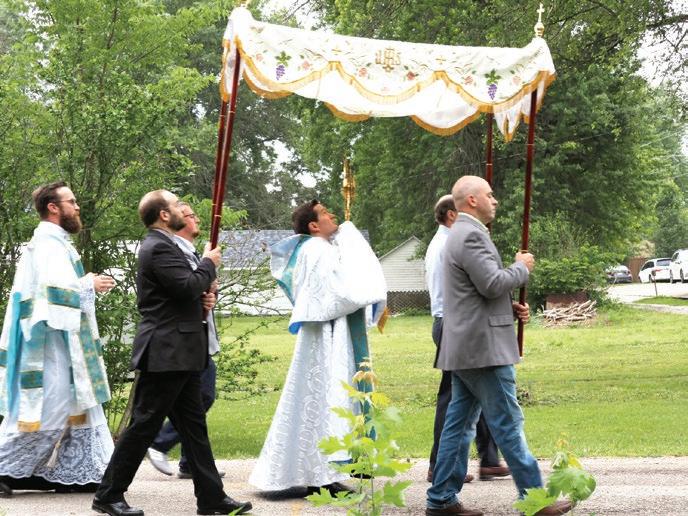
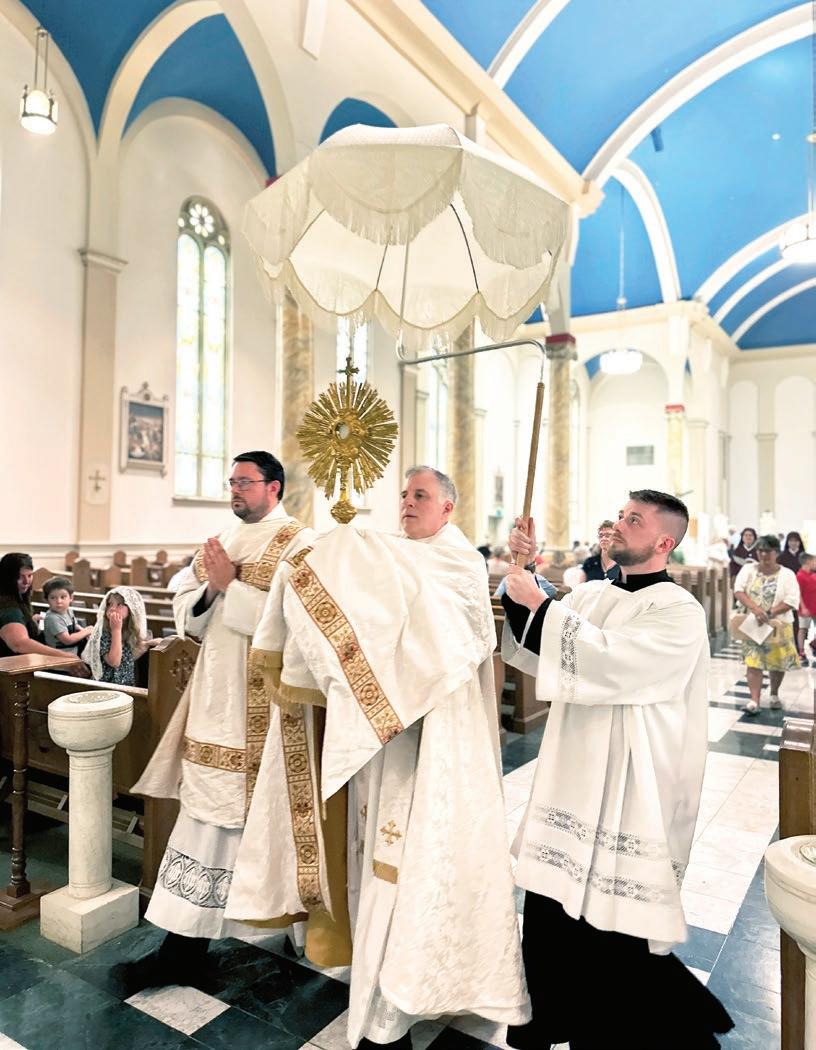
and back to the Cathedral. In Kansas City, Father Charles Rowe led approximately 500 people nearly one and a half miles from Holy Cross Parish to St. Anthony Parish.
“A Corpus Christi procession is important because it shows the city and our community our faith on our sleeves,” explained David Wyble, who helped organize the St. Joseph processions in 2022 and 2023. “We rejoice in our Lord’s presence in a very public way.” Because a Corpus Christi procession is held outdoors, passersby have the opportunity to witness the faithful’s love, honor and devotion for the Blessed Sacrament.

“We need these devotions, like Corpus Christi processions, to deepen our piety and make it more concrete. When we express our love in actions like this, our love grows stronger,” explained Bishop Johnston.
Our diocese has a long tradition of Corpus Christi processions, spanning at least 135 years. Mentions of Corpus Christi processions can be found in The Catholic Tribune (a St. Joseph newspaper) dating back to the 1880s. In recent history, Bishop Robert Finn began leading an annual Corpus Christi procession in 2005 with more than 2,000 faithful processing from Our Lady of Perpetual Help (Redemptorist) Parish to Our Lady of Good Counsel in downtown Kansas City.
In addition to the diocesan Corpus Christi processions,
cover story
Father Kenneth Riley processes with the monstrance and the Blessed Sacrament to begin the 2023 Corpus Christi procession at the Cathedral of St. Joseph. Photo by Christy Gruenbaum.
2023 Corpus Christi procession from St. Patrick Parish, Holden. Photo submitted by parish.
Catholic Key • June/July 2024 • catholickey.org 14
some parishes also offer short Corpus Christi processions.
“Our Hispanic population really loves processions because they manifest their personal experience and culture, as many have walked from and immigrated from a different country,” explained Father Jonathan Davis, pastor of St. Patrick Parish in St. Joseph. St. Patrick Parish has a large Hispanic population and offers Mass in Spanish. The parish offers a short Eucharistic procession for Corpus Christi. A procession “calls to mind walking with Jesus down the road. It’s a symbol of how we are called to walk with Jesus on the road to eternity. God is with us on all the curves and bumps of the road as we move towards Christ,” added Father Davis.
The U.S. Conference of Catholic Bishops (USCCB) is currently sponsoring the National Eucharistic Revival, a three-year
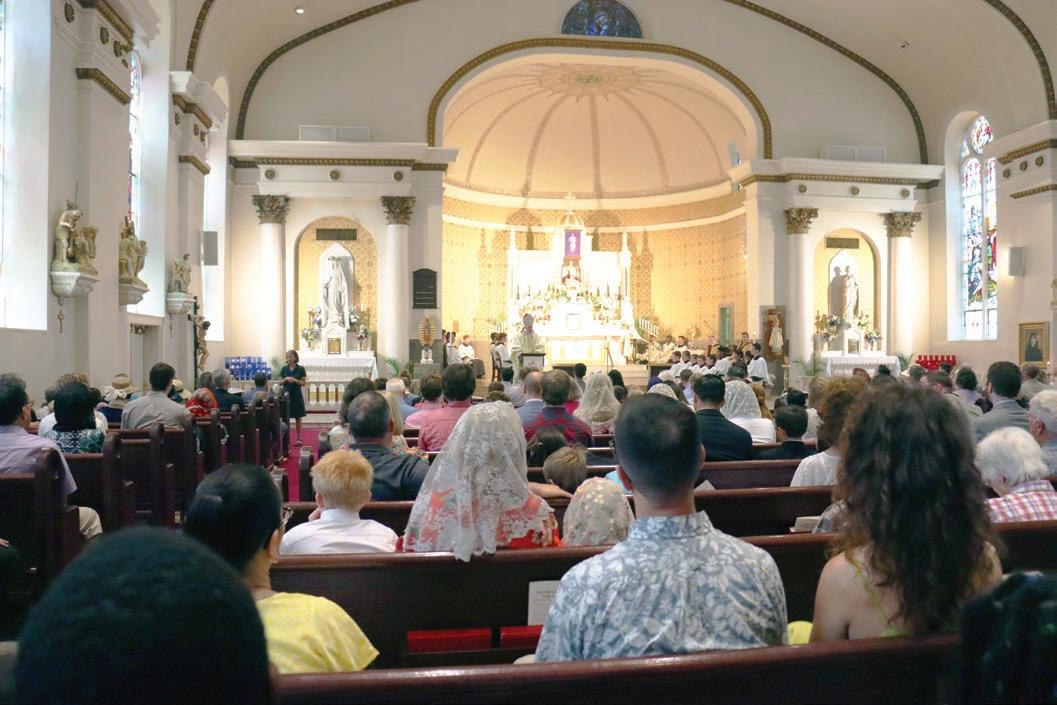
initiative to restore and renew devotion to the Eucharist. Currently, we are celebrating the year of parish revival. The National Eucharistic Revival includes what is likely the longest Eucharistic procession in the history of our nation. This procession consists of four routes, starting in the north, south, east and west regions. The western
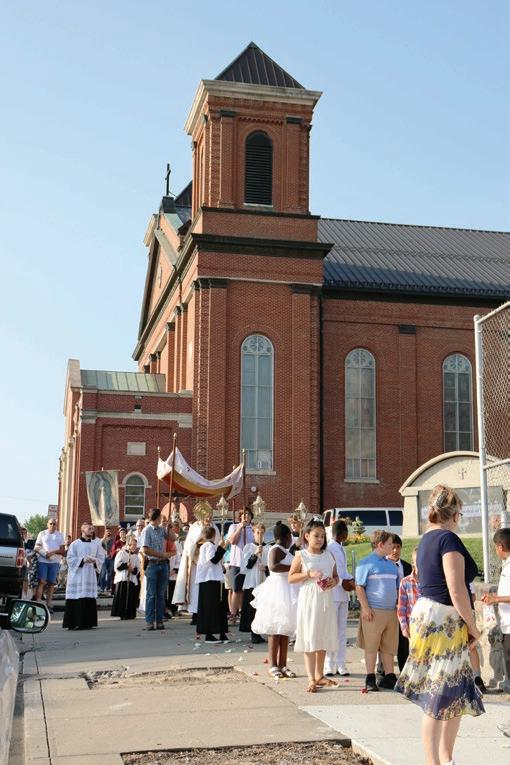

route, which covers more than 2,200 miles, begins in San Francisco, California, and will pass through the Kansas City metro area, making stops at several local churches. Events in our diocese will occur June 29-July 1. The pilgrimage will then culminate in the National Eucharistic Congress which will be held in Indianapolis, Indiana
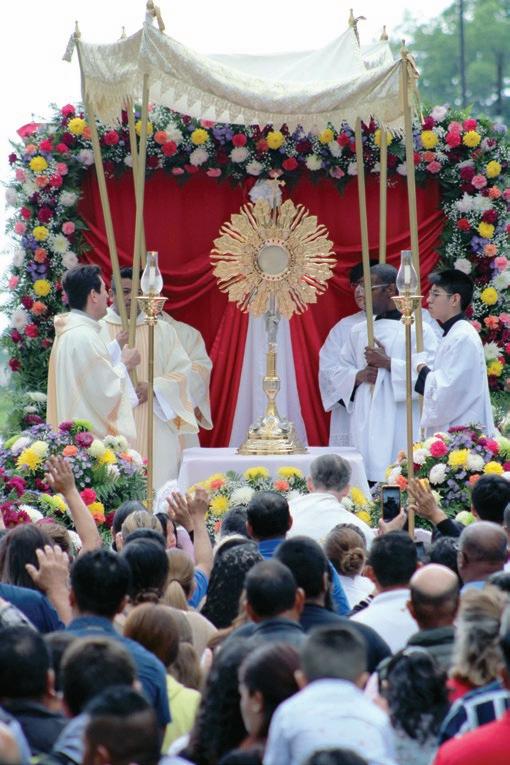
from July 17-21. Plan to join the pilgrimage with events in our diocese and the Kansas City metro area! For more information on the pilgrimage, visit eucharisticpilgrimage.org. [Read more about the events taking place in our diocese on page 34.]
Besides attending a procession, attending adoration or simply stopping by a church to say hello to Jesus is a great way to profess our faith in Jesus, who is really and truly present in the Blessed Sacrament. Another option is to learn a Eucharistic hymn in honor of Corpus Christi (or if you haven’t been blessed with musical talent, play them online). Some favorites include O Sacrament Most Holy, Adoro Te Devote and Tantum Ergo (English editions also exist). Moreover, finding ways to live Corpus Christi is appropriate for all ages as Jesus told us to bring the little children to me.
LEFT: 2022 Corpus Christi procession from Cathedral of St. Joseph. Photo by Megan Marley.
RIGHT: 2023 Corpus Christi procession from Holy Cross Parish, Kansas City. Photo by Christy Gruenbaum.
2022 Corpus Christi Mass at Our Lady of Good Counsel Parish, Kansas City.
Photo by Megan Marley.
15
Conversation with God together
CAN CATHOLIC SPOUSES HAVE A SHARED SPIRITUAL LIFE?
Rooted in love, commitment and shared Faith, Catholic marriage creates a union that can elevate the mundane and bring about the kingdom of God. Conjugal spirituality — the shared spiritual life of spouses — illuminates the path towards a deeper communion with God within the context of the Sacrament of Marriage.
Father Franciszek Blachnicki — a modern apostle of conjugal spirituality — founded the Domestic Church movement to form and pastorally support sacramentally married couples in Krakow, Poland, with the blessing of his archbishop, Karol Wojtyla (later Pope Saint John Paul II) in 1973. Central to his teachings is the ancient phrase “domestic church,” describing the Christian home as the place where conjugal spirituality can flourish and nurture the spiritu-
al growth of both spouses and their children.
Couple prayer serves as the cornerstone of conjugal spirituality, providing couples with a way to develop communion with God, together. In formation materials for the Domestic Church movement, Father Blachnicki describes this approach: “Couple prayer is the prayer of a husband and wife who, standing side by side in the presence of God, want to praise him together, worship him and

story and photo by Dino Durando, director of the Office of the Domestic Church and Discipleship
ask him for the grace of living their sacrament more deeply and for the grace of living according to his will.” In practical terms, this involves the spouses addressing their prayer to God directly and out loud in one another’s presence. “Through their prayer, a couple tells the Lord about their desire to be with him, and admits that without his love, they are not able to love each other as he wants them to.”
Another aspect of conjugal spirituality that Father Blach-
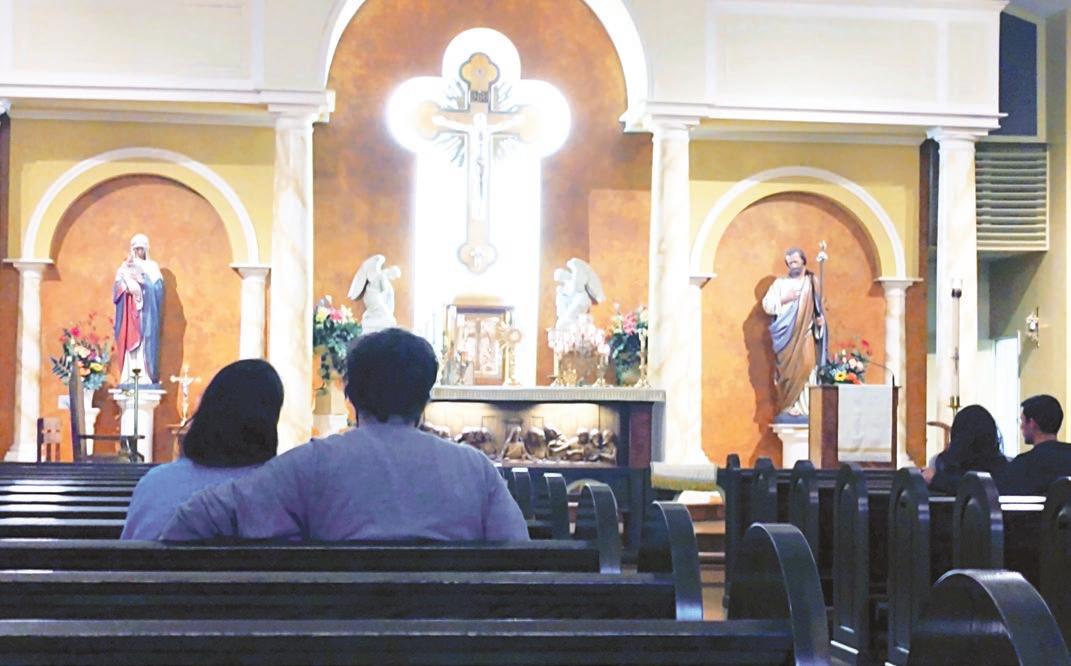
nicki proposed is the monthly couple dialogue, in which spouses open their hearts to God and each other to share their concerns and discuss the needs of their family. Asking “What is God’s will for our marriage and family right now?” is central to this method of discussion. Through these conversations — under God’s eye and in his presence — couples deepen their understanding of one another's spiritual needs, aspirations, and struggles, thus fostering empathy, compassion, and mutual support.
Conjugal spirituality extends beyond the confines of the spouses, encompassing the whole family. In family prayer, the household comes together daily to listen to the word of God and entrust their needs to God as children of the Father. Family prayer has many expressions, and the format must be adapted to the ages, needs and personalities of the children. The fruits of family prayer are faith, compassion, forgiveness and service within the home.
Through the formation materials and retreats of the Domestic Church, Father Blachnicki invites couples to rediscover the sacred within the ordinary, to embrace their vocation with joy and reverence, and to journey together towards the fullness of God's love. In the embrace of conjugal spirituality, marriages are transformed, families are strengthened and God’s love is made manifest to the world.
marriage
Catholic Key • June/July 2024 • catholickey.org 16
Couples pray before the Blessed Sacrament at the Married Couples Retreat offered by the Domestic Church movement at St. Andrew the Apostle Parish in 2024.
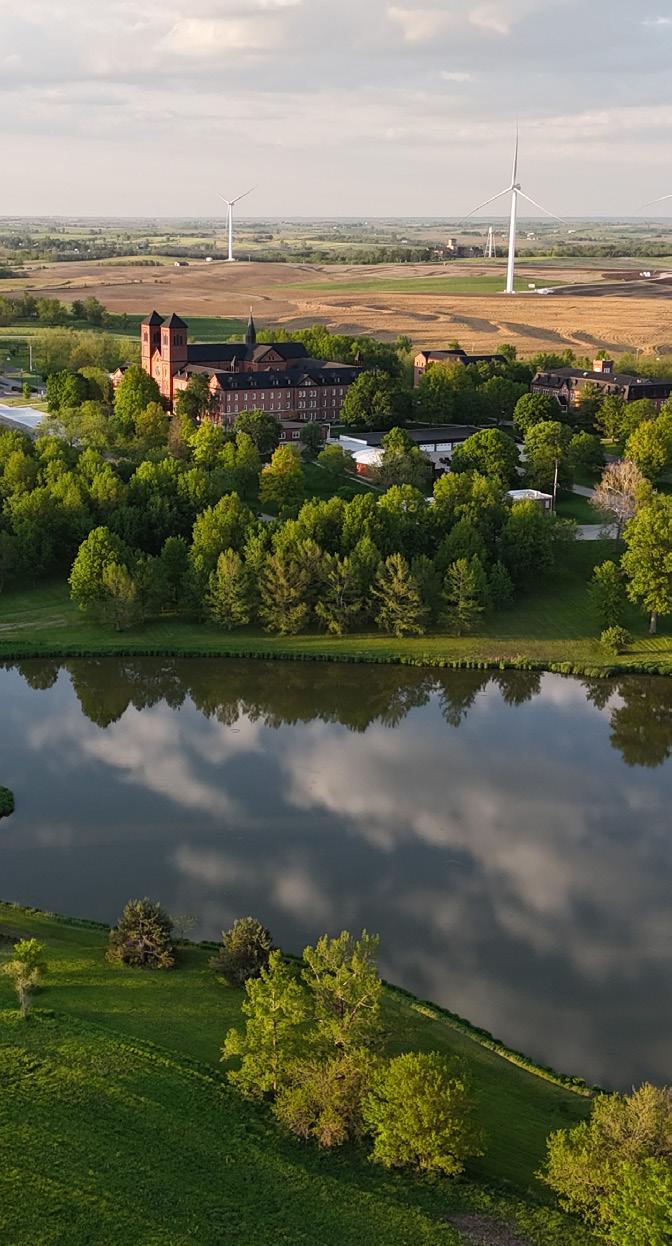
Experience Benedictine Spirituality
Encounter Christ on a Retreat
Conception Abbey’s Benedictine retreats draw from more than 1500 years of wisdom in the Benedictine tradition and are rooted in the principles outlined by St. Benedict in his Holy Rule
On these retreats you can expect:
• Four conferences given by a monk, intended to lead the retreatant to encounter Christ
• Participation in the Divine Office and Mass with the monastic community
• Specific times for personal prayer and lectio divina
• Adoration of the Blessed Sacrament and the Sacrament of Reconciliation
• Silence and a technology “fast”
Parish groups welcome! Visit conceptionabbey.org/guests or scan the QR code to view all of our retreat listings.
Men’s Retreats
July 12–14
August 9–11
September 6–8
Women’s Retreats
July 26–28
August 23–25
November 22–24
December 13–15
2025 dates now available!
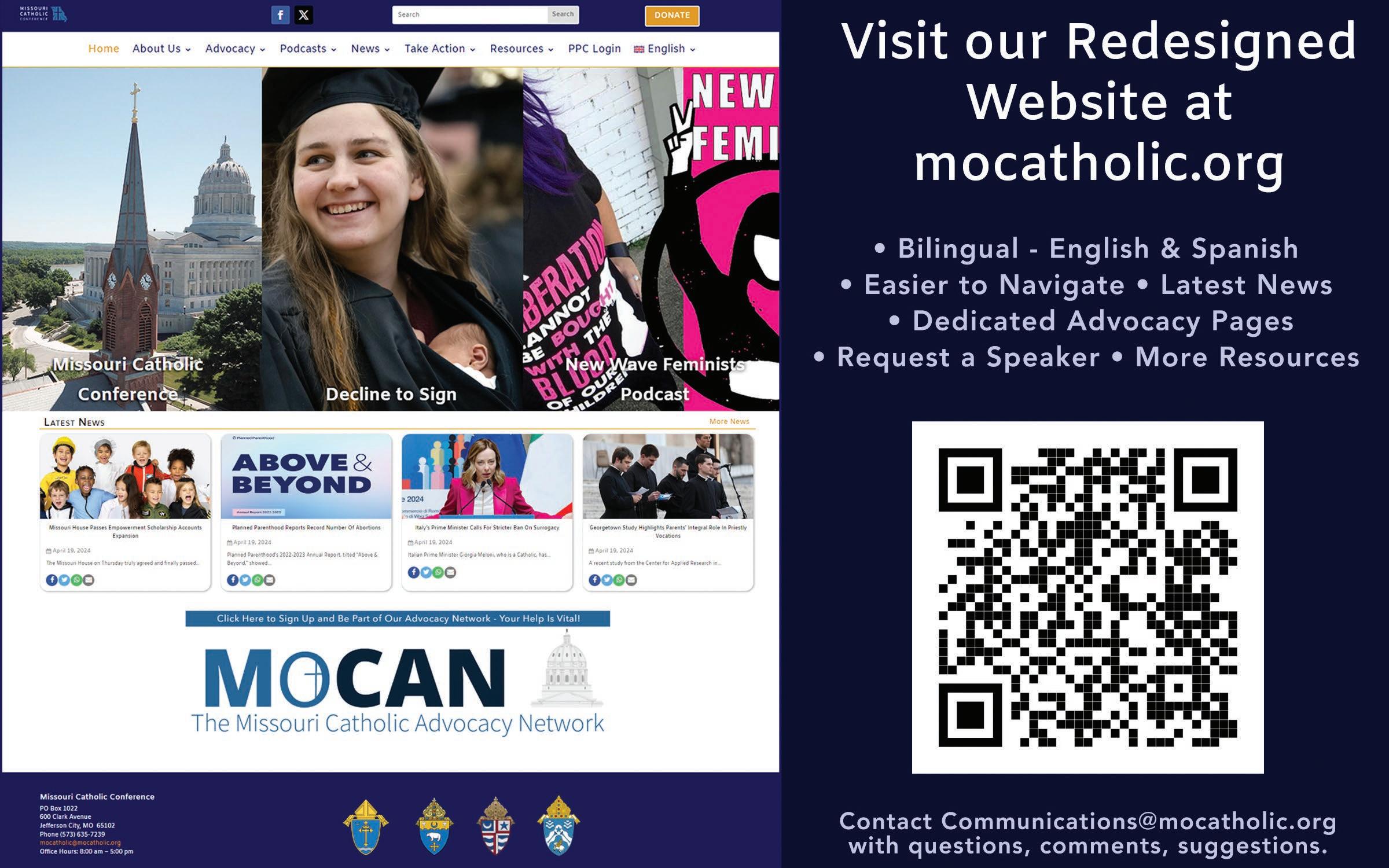
Revitalized DCCW is BRINGING OTHERS TO CHRIST
When COVID-19 reached pandemic force in 2020, many organizations and businesses shut down, among them the Diocesan Council of Catholic Women (DCCW) of the Diocese of Kansas City-St. Joseph. Now, the DCCW is looking to revitalize and welcome new members.
By Marty Denzer
Beverly South, who succeeded Kathleen Philpott as president of the local DCCW in December 2023, shared some of the council’s plans and hopes.
The local DCCW is an affiliate of the National Council of Catholic Women, which was established in 1920 at the suggestion of the U.S. Bishops. The bishops were cognizant of the good works of Catholic women’s organizations during World War I and called for unification of the various groups. By 1970, the NCCW had members in diocesan councils nationwide. Members are involved in leadership, service and spirituality. The Kansas City-St. Joseph DCCW works to educate, support and empower women on current issues and events. South, of St. Bernadette Parish, and the Executive Committee members — Dana Tucker, recording secretary, St. Jude Parish; Cindy Waits, vice president, St. Mary Parish (St. Cyril) and Carol Balistreri, treasurer, St. Jude Parish were installed in December 2023. Since then, a website, Facebook page and a business email address have been set up. South said she and the Board of Directors have met with Bishop James Johnston. Msgr. Brad Offutt, pastor of St. Mark’s Parish in Independence, has been appointed spiritual adviser. Other members have been busy, too. A brochure has been designed, introductory letters have been written to priests and a DCCW shirt has been created.
The first quarterly meeting of the new DCCW was in March, with a focus on mental health, with Deacon Shane Voyles, St. John
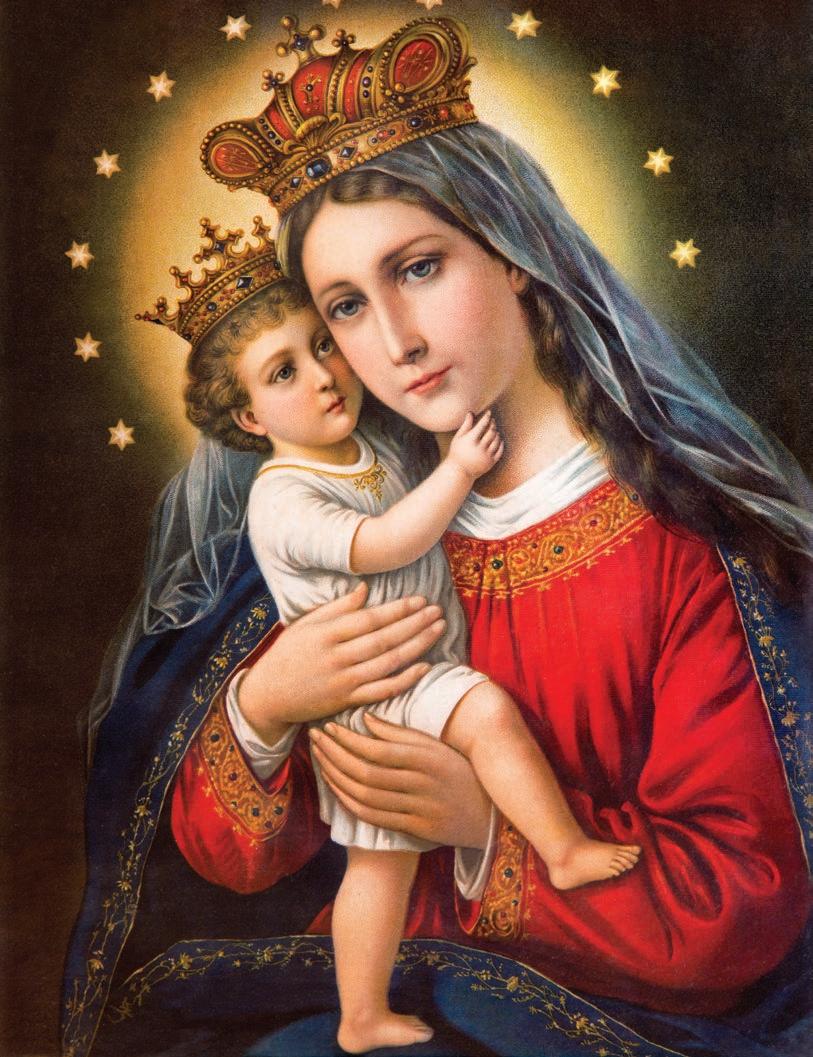
LaLande Parish, as speaker. South and other members have been working to raise awareness of regional human trafficking.
The DCCW offers safety, support and fellowship while sharing the Blessed Mother’s role in bringing others to Christ through spirituality, leadership and service. Desiring to interest young women in joining, the Golden Rose program has been started in some dioceses across the country. South hopes a Golden Rose program can begin in the Kansas City-St. Joseph Diocese in 2026. High school girls, accompanied by their mothers, would be recognized at a luncheon for service, leadership and spirituality, receiving a Golden Rose certificate and DCCW membership. The goal is to provide a place for all Catholic women to feel safe, supported and empowered; to grow in spirituality and become leaders in and promoters of the Catholic Faith.
FOR MORE INFORMATION, visit dccwKCSJ.org or facebook.com/mary.dccw or email mary.dccw@gmail.com
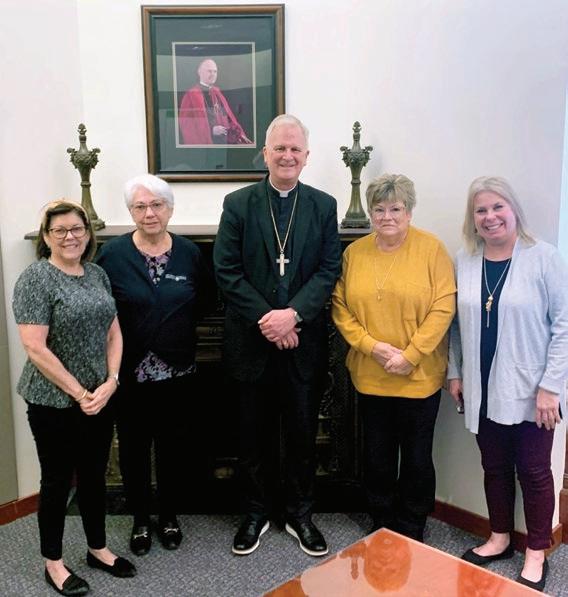
feature
Pictured (L to R): Cindy Waits, vice president, St. Mary Parish (Kansas City); Beverly South, president, St. Bernadette Parish (Kansas City); Bishop James Johnston; Carol Balistreri, treasurer and Dana Tucker, recording secretary, St. Jude Parish (Oak Grove). Photo by Beverly South
Getty Images/sedmak
Catholic Key • June/July 2024 • catholickey.org 18
hispanic ministry
CONVERSION AND CAMARADERIE: LATINO YOUTH NEED A CATHOLIC SUMMER!
Story and photo By Leyden Rovelo-Krull
“IT
WAS INCREDIBLE! I HAVE BEEN SHARING ABOUT JESUS ALL HIS LIFE. I GUESS HE NEEDED TO HEAR FROM OTHER YOUNG PEOPLE!” said Gisela Buenrostro, of Sacred Heart Guadalupe Parish, when recounting her son Eddie’s experience at Camp Savio in 2023. Eddie, she says, came home with a stronger faith. “He’s not the same boy,” Gisela happily relates. “Camp changed him for the better.”
Through the generosity of a grant from the St. Francis Xavier/ Visitation Catholic Communities, my office has been able to send Hispanic/Latino Catholic kids to summer camp for the last two years. Our diocesan camps offer a unique opportunity for young Latinos to deepen their faith, build lasting friendships and connect with their religious heritage. Through a combination of religious teachings, recreational activities and fellowship, Catholic summer camps play a vital role in shaping the identity and values of Latino youth.
Often part of mixed-status families, Hispanic/Latino youth can be particularly vulnerable to crises of identity. They need opportunities to be affirmed in their primary identity as sons and daughters of God.
“[M]y son attended [the diocesan] summer camp. … When I went to pick him up … he [was] excited to share that he had an encounter with Christ, which changed his life forever,” Carmina Bernal shared about her son’s experiences at camp.
The Church has long recognized the need to engage and support Latino youth, acknowledging their unique cultural background and the challenges they face today. In his apostolic exhortation Cristus Vivit, Pope Francis emphasizes the importance of this ministry, stating “young people are the 'now' of God” and calling for a renewed focus on empowering and guiding young individuals in their faith journey.
One of the key findings of the V Encuentro process, a process that engaged Hispanic pastoral leaders nationwide, found: “If the Catholic community in the United States wants to have a vibrant and fruitful future during the rest of this century, we must turn our attention and resources immediately to serve and ac-
company Hispanic youth and young adults. This is not an option but an imperative, given the size of this population within the Church.”
Catholic summer camps provide a sense of community and belonging for Latino youth, many of whom may feel marginalized or disconnected from their cultural roots in mainstream society. The camps create a space where young Latinos can fellowship with youth from all over the diocese. This communal aspect is particularly significant for Latino youth, as it instills a sense of pride in their religious heritage and fosters a supportive network of peers who understand and affirm their Catholic identity.
In addition to spiritual and communal benefits, Catholic summer camps offer a range of activities that promote personal growth and leadership development, much needed among Latino youth. From team-building exercises to service projects, these camps provide opportunities for participants to develop essential life skills, such as communication, collaboration and empathy. Through these experiences, young Latinos can cultivate a sense of responsibility and service to others, aligning with the core values of the Catholic Faith and preparing them to be active and engaged members of their communities.
The significance of Catholic summer camps for Latino youth is further underscored by the positive impact they have on the overall well-being of participants. Research has shown that engaging in faith-based activities and community involvement can contribute to greater resilience, improved mental health, and a sense of purpose among youth.
As Pope Francis affirms, investing in young people’s spiritual formation and well-being is essential. Catholic summer camps are a beacon of hope and empowerment for Latino youth as they embrace their faith heritage.
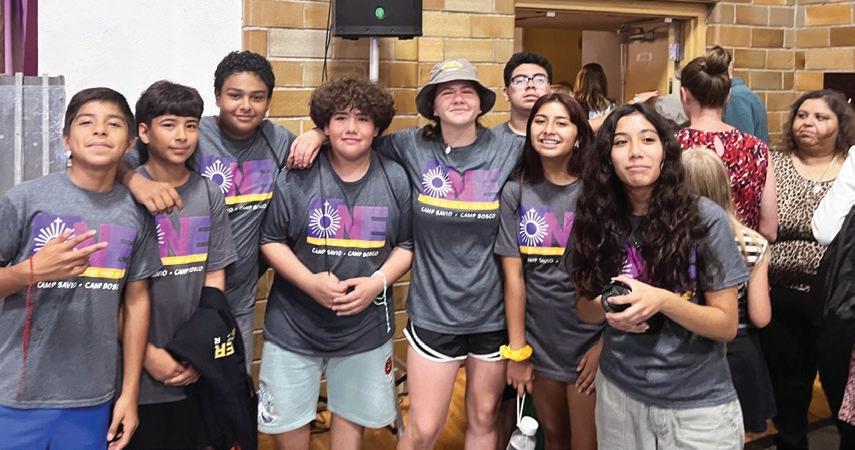
A group of campers
gather during 2023 Camp Savio at Conception Abbey in Conception, MO.
19
By Kylie Helmer
Our Lady of Hope Society

“THOUGH SHE ENJOYS THE GLORY OF HEAVEN, THE VIRGIN MARY IS STILL LOVINGLY CONCERNED WITH THE STRUGGLES OF HER CHILDREN ON EARTH. SHE CONSTANTLY INTERCEDES FOR OUR NEEDS WITH A MOTHER'S LOVE.”
— Our Lady of Hope Society
catholic charities
Photos by John Caulfield and Glenn Hemberger
Arleth Recio, senior at Notre Dame de Sion High School in Kansas City, was a debutante in the 2024 Our Lady of Hope Society and designed the logo for this year’s Hope Ball.
Catholic Key • June/July 2024 • catholickey.org 20
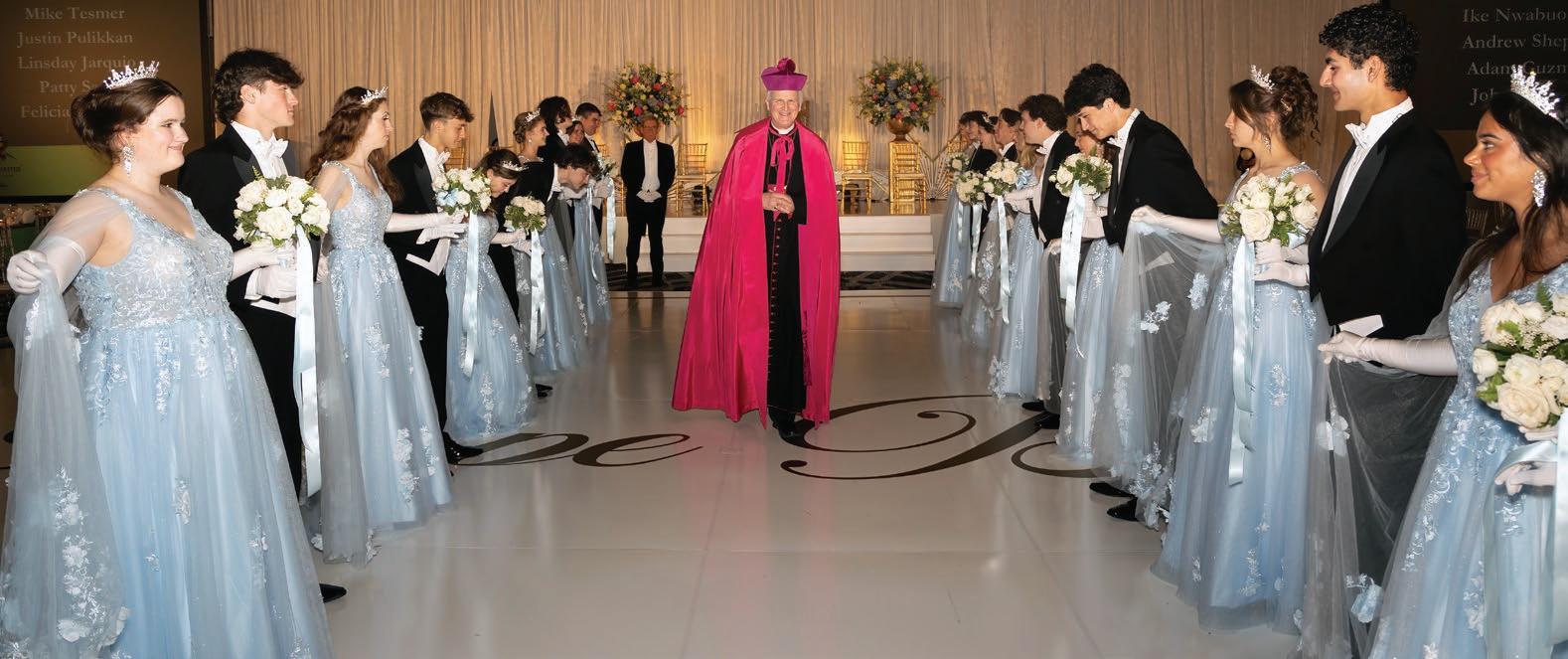
This spring, Catholic Charities of Kansas City-St. Joseph announced the inaugration of the Our Lady of Hope Society which recognizes high school juniors and seniors who demonstrate a commitment to the Catholic Charities mission. Twelve young ladies and 12 young men were honored at Catholic Charities’ annual Hope Ball.
The honorees were selected based on their acts of charity, being of good character and living out their Catholic Faith. Their names were submitted by their high school administration, parish leadership or the broader community.
The 2024 Hope Ball was reimagined to incorporate and honor charitable young people. Bishop Johnston requested the event to focus on our Holy Mother, which led to the Society’s name and the evening’s Marian influence.
One of this year’s honorees, Arleth Recio, was recognized for creating the new logo for the Hope Ball, held on April 27 in Kansas City.
Arleth is a native Kansas Citian and is currently a senior at Notre Dame de Sion High School. “I created a variety of designs and sought feedback from my peers and my graphic design teacher,” she said. “All the logos I designed were collaborative. I was honored that the final design I submitted was selected.”
“My family and I view Mary as La Virgin de Guadalupe. It’s such a beautiful story of how she appeared to Saint Juan Diego. I view Mary as a second mother, as my Holy Mother,” she said.
Arleth is active at Sion, play-
ing softball and flag football, and she is co-editor-in-chief of the school magazine. She expressed enthusiasm about her volunteer work with kids.
Catholic Charities of Kansas City-St. Joseph hosted the Hope Ball at the Muehlebach Hotel to honor these young men and women, as well as celebrate its mission to serve families struggling to meet their basic life needs. It was a beautiful evening for the honorees and guests in attendance, thanks to so many generous supporters.
Rita and Lamar Hunt, Jr. were the chairs of the Hope Ball. They spoke words of gratitude and appreciation for all the important works of Catholic Charities, as well as to the honorees for their commitment to the Catholic Charities mission.
Arleth and the rest of the honorees were recognized for their charitable acts and strong potential to be leaders within the Catholic faith for years to come. Arleth couldn’t express enough praise and gratitude to Catholic Charities for showering her and the rest of the honorees with such love and recognition.
The students started their evening by attending Mass celebrated by Bishop Johnston. Afterwards, they were present-
ed to Bishop Johnston and the broader community.
“I had a ton of fun at the event, it was better than I could have imagined!” Arleth exclaimed. “I still feel very honored about the recognition, and it's really nice to know that maybe by the time I have my own children the Hope Ball will still be around and my logo still there, but until then I can say with confidence I have already left a mark on my community, even if it's something as simple as designing a logo.”
Arleth’s favorite aspect of the evening was the dancing. “My mom and I stayed until the end of the ball, literally dancing the night away. It is something I will never forget,” she fondly recalled.
When asked what Arleth’s next steps are after high school

graduation, she stated that she will definitely be pursuing a career in healthcare. “I am planning on going to college, Creighton University is my top choice,“ she said. “I intend to major in biochemistry or biology on a pre-med track.”
Arleth also intends to stay true to her Catholic Faith. “If I could lead a Catholic ministry in the future, it will definitely have something to do with healthcare since medicine is something I love,” she said.
Arleth provided the following advice for any incoming high school student who wants to participate in Our Lady of Hope Society: “If you are nominated and even a tiny bit interested, you should do it! It was a ton of fun and honestly so worth it.”
Do you know an exemplary high school student who will be a junior or senior during the 20242025 school year? Have they demonstrated a commitment to the Catholic Charities’ mission? Catholic Charities has already started accepting applications for student nominations for next spring’s 2025 Hope Ball. Deadline to submit is 9/27/2024.
If you’re interested in volunteering and/or learning more about Catholic Charities, please call 816.221.4377 or email at assistance@ccharities. com or visit one of our locations. You may also visit our website for more information: www.catholiccharities-kcsj.org
21
The 2024 Our Lady of Hope Society debutantes and escorts with Bishop James Johnston as he departs the induction ceremony.
The mess makes a path for beauty
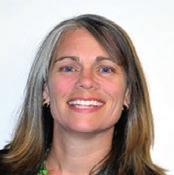 By Karen Ridder
By Karen Ridder
MY

KITCHEN ISLAND IS A MESS WAY MORE OFTEN THAN IT’S NOT. ALL SIX OF US BELIEVE WE HAVE TO “DO THE DISHES” MORE THAN ANYONE ELSE. THE REASON FOR THE REPEATING SITUATION SEEMS TO ELUDE US ALL. WE HOLD IT IN MYSTERY.
We try MANY ways to solve this problem, with limited success. A tattered chore chart is sporadically followed. A call to work together often involves my children moving around a lot without actually helping. We partially clean way more often than we complete the job.
The spiritual journey can be like this. We go to Mass on Sunday; do our devotions; pray. But all too often, we look up and discover ourselves in another mess.
Like the kitchen island, the situation seems to be a mystery. It certainly couldn’t be connected to skipping a few
prayers, hurriedly going through the motions at Sunday Mass or leaving our confessions incomplete. Right?
The piles between us and all the gifts God has for us grow up quickly — just like the dishes. It is easy to end up feeling like a colossal failure of both spirituality AND housekeeping.
But that’s not quite right.
The Gospel of Luke introduces us to the sisters Mary and Martha of Bethany. Martha NEVER would have left a dish in the sink, and I imagine her spiritual practices were perfect as well. Mary, on the other hand, just didn’t
seem to think of those dishes as a problem. She sat with Jesus instead. Jesus didn’t say Martha was wrong, but he didn’t say Mary was either. He delighted in both.
My mess makes me feel inept at serving God and my family. I think I should be a better woman, one with a clean house, well-managed time and children who always listen to her direction, but that would also make me someone else.
God doesn’t call us to be someone else. He calls us to be us. That means embracing our messes and finding beauty in them.
At my son’s Confirmation last year, Bishop Johnston said to the group, “God made you because he thought the world couldn’t do without you.”
You. Not the next person with a cleaner kitchen island. You.
God wanted his creation to have both your strengths AND your weaknesses. He thinks they are beautiful.
The dishes don’t actually take long to clean up. When we eventually do it, I’ve noticed the mess makes a path for beauty.
Those dishes also say, “We are here. We are living.” I won’t always have so many people in my home to keep using those dishes.
I often phone a friend to talk while I work — helping me stay connected. My husband listens to music. Our children use the task to smooth out the edges of their relationships with each other — laughing, bickering, laying foundations.
We should keep trying, but with an eye for the beauty in the gift of our mess. It really IS a mystery. It’s real. God is there.
parenting
Catholic Key • June/July 2024 • catholickey.org 22
Humble chapel, mighty ministry
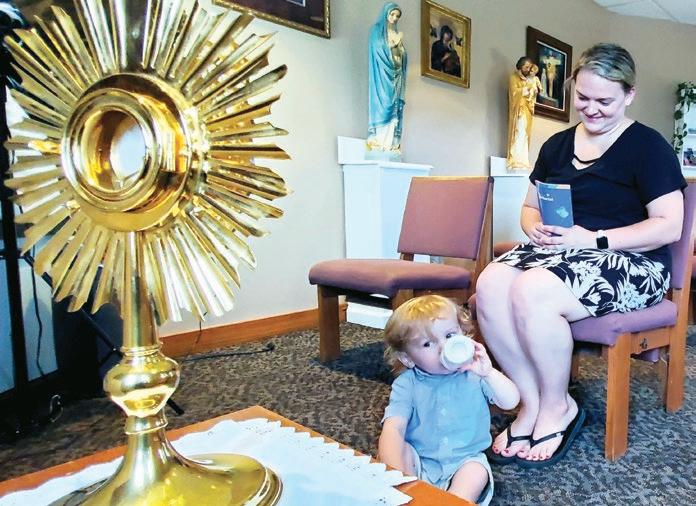
“I
n an otherwise ordinary space, the extraordinary can happen,”
Monica Arredondo answered when asked what the tagline of St. Therese Parish Adoration Chapel, at 7207 NW Hwy 9 in Kansas City, meant to her. The tagline reads: The humble chapel that hosts a mighty ministry . Arrendondo is the Lead Chapel Coordinator and a regular adorer.
By Allison Vrooman
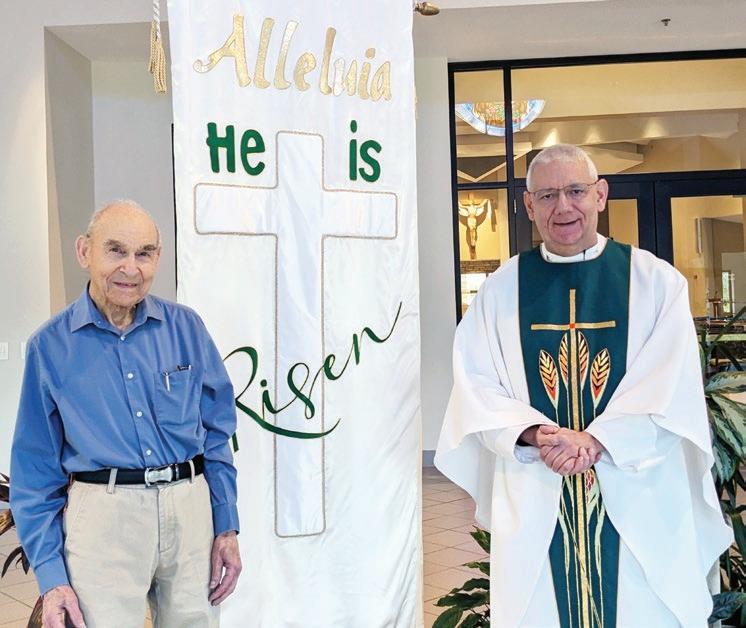
In its beginning, on Ash Wednesday in 1999, the chapel was a room connected to the main church with a window that looked into the tabernacle, allowing visits to the Blessed Sacrament while the church was closed. A year passed and many parishioners expressed interest in having Eucharistic adoration in that space. Among these voices was a longtime parishioner, Bill Rumker. Now 97 years old and a regular adoration hour holder, Rumker played a fundamental role in the forming of this ministry into what it is today. “Bill was vital in getting spots filled and making sure people showed up,” Arrendondo shared.
Rumker employed the help of Arrendondo in 2015 and advancements were made for a more efficient scheduling process. Previously, everything was done by paper and phone calls, which proved to be unreliable and time-consuming, as multiple calls were made in search of substitutes. Now, with the help of an online scheduler, adorers can easily sign in and out, report their unavailability and send mass messages to find a substitute to fill their spot.
Father Joseph Cisetti, current pastor, but then associate pastor at St. Therese Catholic Church when the chapel was established, has watched the presence of the Lord grow in the parish community: “Spending time in front of our Lord is so valuable. In the midst of all the busyness that goes on, it’s good to know that there are people praying.”
Today, there are more than 200 people signed up as either routine or substitute adorers, with an estimated 70 people who drop in each week. The chapel reached its 25th anniversary on Ash Wednesday of this year. Given that the occasion fell on a solemn liturgical day, celebration was held in advance.
Spending time in front of our Lord is so valuable. In the midst of all the busyness that goes on, it’s good to know that there are people praying.”
Father Paul Hoesing, a priest from the Archdiocese of Omaha and a National Eucharistic Preacher, shared a greater insight on the Holy Eucharist at Masses on the weekend of Jan. 14. That began a 30-day calendar of prayer intentions leading up to the anniversary.
The hope for the next 25 years of the adoration chapel is that it continues to be a place of peace and spiritual rejuvenation for the community.
feature
23
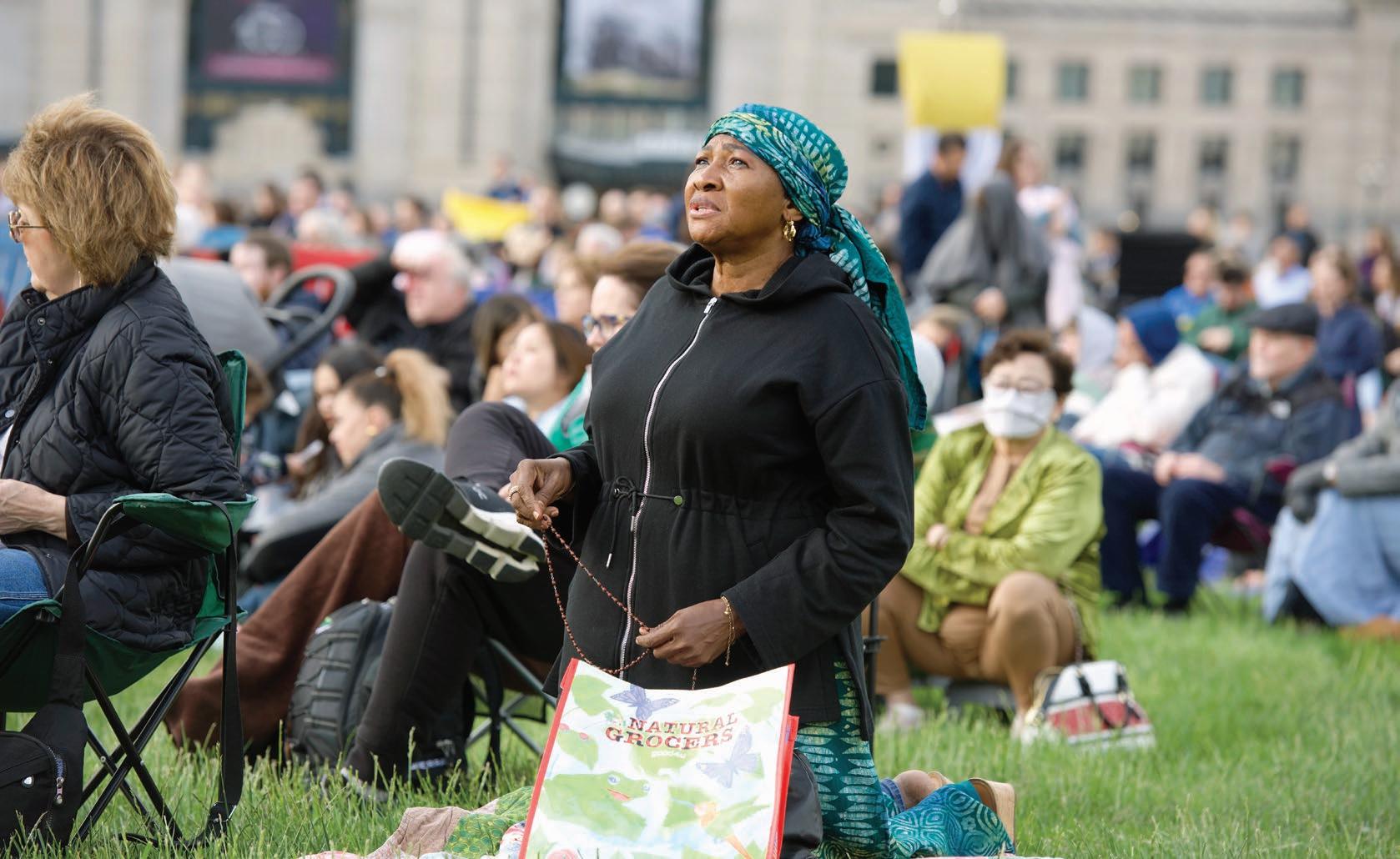
An open letter to the
BODY OF CHRIST
The Church, God’s gift of holiness for his people, can be described as the Body of Christ endowed with two divinely inspired elements.
First, there is the hierarchical body of ordained spiritual leaders anointed with the faculties for preaching, teaching, discerning, interpreting and administering the Mission of Christ.
Then there is the element of the Body of Christ made up of those clergy, religious, lay men, women and children commissioned to carry out the Ministry of Christ through more direct engagement in the world — giving aid, comfort and rescue to distraught souls.
young adults caught up in destructive behaviors — revenge, retaliation, gun violence, sexual activity, drug & alcohol abuse, and even irreligious beliefs.
political, cultural or even religious perception.

Read Deacon Greene’s full letter at catholickey.org.
It is this latter part of the Body of Christ, especially charged, with boots on the ground and spiritual awareness, who considers the souls of youth and
It is this part of the Body of Christ who attentively considers the women who may have a high regard for children as a gift from God, yet find themselves enmeshed in fear, dread and disbelief in their mental or physical ability to carry a baby from conception to its fulfillment of life.
The Body of Christ does not ignore the souls of individuals who believe themselves superior to every other human being, based on some irrational social,
Sacred Scripture reveals that by our Baptism we are configured and conformed to Christ by an indelible character that can never be repeated or removed. (Gal 3:27) We have a spiritual personality that cries out for the activity of God in our lives. An activity not focused on the self alone, but on the other.
Our spiritual personality follows that of the prophets Moses and Martin. Both went up to the mountaintop and they saw the Promised Land. They did not get there themselves, but the reality of the promised land is left for the Body of Christ to experience.
The spiritual personality believes God will give us a vision of ministry down in the valley. If God gives us life, freedom and the grace to live our lives according to his will, will he not also give us a vision?
Deacon Ken Greene is husband to Carolyn; father to Wyvonne, Tonya and Dominick; grandfather to five; and great-grandfather to nine. Deacon Greene is the RCIA coordinator for St. Monica Parish, at 1616 Paseo Blvd. in Kansas City
Jesus did not ignore or bypass Galilee or Samaria because they were Gentiles. Why should we?
Body of Christ, consider these questions: “How would your political, social or even economic decision-making be affected if you adhered to your spiritual personality within your immediate, environmental reality?”
Body of Christ, dare to allow your spiritual personality to stream the dream of possibilities that lie beyond the horizon. Dare to trust in the Lord’s victory over evil and death.
by Moira
black catholic spirituality
Photo
Cummings
Catholic Key • June/July 2024 • catholickey.org 24
CONVERSIÓN Y CAMARADERÍA: ¡LOS JÓVENES LATINOS NECESITAN UN VERANO CATÓLICO!
Por Leyden Rovelo-Krull
“¡Fue increíble! He estado compartiendo sobre Jesús toda su vida. ¡Supongo que necesitaba escuchar a otros jóvenes!” dijo Gisela Buenrostro, parroquia del Sagrado Corazón de Guadalupe, al relatar la experiencia de su hijo Eddie en Camp Savio en 2023. Eddie, dice, regresó a casa con una fe más fuerte. “No es el mismo niño”, relata alegremente Gisela, “el campamento lo cambió para mejor”.
Gracias a la generosidad de una subvención de St. Francis Xavier/ Visitation Catholic Communities, mi oficina ha podido enviar niños católicos hispanos/latinos a campamentos de verano durante los últimos dos años. Nuestros campamentos diocesanos ofrecen una oportunidad única para que los jóvenes latinos profundicen su fe, forjen amistades duraderas y se conecten con su herencia religiosa. A través de una combinación de enseñanzas religiosas, actividades recreativas y compañerismo, los campamentos de verano católicos desempeñan un papel vital en la formación de la identidad y los valores de la juventud latina.
Los jóvenes hispanos/latinos, que a menudo forman parte de familias de estatus mixto, pueden ser particularmente vulnerables a las crisis de identidad. Necesitan oportunidades para afirmarse en su identidad primaria como hijos e hijas de Dios.
“[M]i hijo asistió al campamento de verano [diocesano]... cuando fui a recogerlo... él [estaba] emocionado de compartir que tuvo un encuentro con Cristo, que cambió su vida para siempre”, Carmina Bernal compartió sobre las experiencias de su hijo en el campamento.
La Iglesia siempre ha reconocido la necesidad de involucrar y apoyar a los jóvenes latinos, reconociendo su origen cultural único y los desafíos que enfrentan hoy en día. En su exhortación apostólica Cristus Vivit, el Papa Francisco enfatiza la importancia de este ministerio, afirmando que “los jóvenes son el ‘ahora’ de Dios” y pidiendo un enfoque renovado en empoderar y guiar a los jóvenes en su camino de fe. Uno de los hallazgos clave del proceso del V Encuentro, un proceso que involucró a líderes pastorales hispanos en todo el país, encontró que “si la comunidad católica en los
Estados Unidos quiere tener un futuro vibrante y fructífero durante el resto de este siglo, debemos volver nuestra atención y recursos de manera inmediata para servir y acompañar a los jóvenes y jóvenes adultos hispanos. Esto no es una opción sino un imperativo, dado el tamaño de esta población dentro de la Iglesia”.
Los campamentos de verano católicos brindan un sentido de comunidad y pertenencia a los jóvenes latinos, muchos de los cuales pueden sentirse marginados o desconectados de sus raíces culturales en la sociedad en general. Los campamentos crean un espacio donde los jóvenes latinos pueden tener compañerismo con jóvenes de toda la diócesis. Este aspecto comunitario es particularmente significativo para los jóvenes latinos, ya que infunde un sentimiento de orgullo por su herencia religiosa y fomenta una red de apoyo que comprende y afirma su identidad católica.
Además de los beneficios espirituales y comunitarios, los campamentos de verano católicos ofrecen una variedad de actividades que promueven el crecimiento personal y el desarrollo del liderazgo, muy necesarios entre los jóvenes latinos. Desde ejercicios de formación de equipos hasta proyectos de servicio, estos campamentos brindan oportunidades para que los participantes desarrollen habilidades esenciales para la vida, como la comunicación, la colaboración y la empatía. A través de estas experiencias, los jóvenes latinos pueden cultivar un sentido de responsabilidad y servicio a los demás, alineándose con los valores fundamentales de la fe católica y preparándolos para ser miembros activos y comprometidos de sus comunidades.
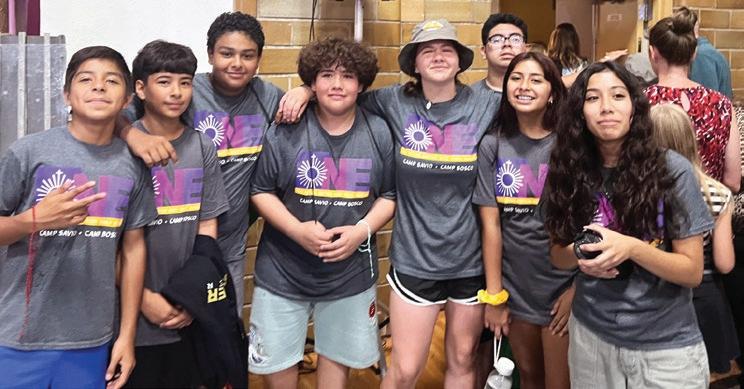
La importancia de los campamentos de verano católicos para jóvenes latinos se ve aún más subrayada por el impacto positivo que tienen en el bienestar general de los participantes. Varios estudios han demostrado que participar en actividades religiosas y la participación comunitaria puede contribuir a una mayor resiliencia, una mejor salud mental y un sentido de propósito entre los jóvenes. Como afirma el Papa Francisco, invertir en la formación espiritual y el bienestar de los jóvenes es esencial. Los campamentos de verano católicos son un faro de esperanza y empoderamiento para los jóvenes latinos a medida que abrazan su herencia de fe.
Ministerio Hispano
25
¿ADÓNDE VAS?
LUEGO DIJO JESÚS A SUS DISCÍPULOS:
“SI ALGUIEN QUIERE SER MI DISCÍPULO,
TIENE QUE NEGARSE A SÍ MISMO, TOMAR SU CRUZ Y SEGUIRME.
PORQUE EL QUE QUIERA
SALVAR SU VIDA, LA PERDERÁ; PERO EL QUE PIERDA SU VIDA POR MI CAUSA, LA ENCONTRARÁ”.
— MATEO 16:24-25

en el camino
Annibale Carracci, Public domain Catholic Key • June/July 2024 • catholickey.org 26

Del Obispo
El obispo James V. Johnston, Jr. es el séptimo obispode la Diócesis de Kansas City-St. Joseph

Existe una historia bien conocida que se conoce como la tradición “Quo Vadis” que cuenta que, durante la persecución a los Cristianos del Emperador Romano Nerón en el siglo I, San Pedro estaba huyendo de Roma por la Vía Apia, quizás por miedo o por el deseo de asegurarse que podría cumplir sus deberes para con la Iglesia incipiente como “la Roca”, cuando encontró a Jesús que venía en dirección contraria, hacia Roma. Sorprendido, Pedro le preguntó a Jesús, “Quo Vadis, Domine” o “Señor, ¿adónde vas?”. A lo que Jesús replicó, “Voy a Roma a que me crucifiquen” y luego desapareció. Entonces, Pedro se dio la vuelta y regresó a Roma para enfrentar su martirio, y fue crucificado con la cabeza hacia abajo como lo cuenta la tradición. Si usted visita actualmente Roma, encontrará una iglesia en la Vía Apia donde se dice que ocurrió ese encuentro.
Para un discípulo, es bueno reflexionar sobre esa historia ya que se relaciona con nuestro propio viaje. Incluso se puede hacer de la pregunta una oración diaria para la meditación, preguntarle a Jesús, “Señor, ¿adónde vas hoy?”. La vida Cristiana implica seguir a Jesús en nuestras propias vidas, dondequiera que Él vaya. Con demasiada frecuencia podemos caer en una actitud demasiado independiente en la cual vamos en una dirección y ¡le pedimos al Señor que nos siga a nosotros! Todos los años nuestra Oficina Vocacional ofrece un retiro Quo Vadis para jóvenes que están dispuestos a discernir sobre el llamado al sacerdocio. Es tiempo de poner los propios planes a un lado y hacer la misma pregunta que le hizo San Pedro a Jesús. ¿Adónde vas? ¡Esto implica que la respuesta tiene una gran influencia acerca de donde necesitamos ir nosotros también! Lo mismo es válido para todos los Cristianos.
La historia también ilumina la tendencia a huir de la cruz y del sacrificio, como lo hizo Pedro. Antes de la pasión de Jesús, Pedro trató de disuadir a Jesús de ir a Jerusalén porque Jesús había compartido con ellos que sería entregado y condenado a muerte. En esa ocasión Jesús reprendió a Pedro. Quizás Pedro recordó eso nuevamente cuando encontró a Jesús en la Vía Apia. Es algo que todos necesitamos recordar — la tentación de ceder al miedo o a lo que parece más conveniente, en lugar de seguir a Jesús, su Evangelio y las enseñanzas de la Iglesia. Si somos discípulos de Jesús, debemos seguirlo y no al revés. Y para hacerlo, debemos hacer nuestra la pregunta de San Pedro. “¿Adónde vas Señor?”.
27
Parkville Women’s Clinic Teaching, supporting and celebrating parenthood
By Marty Denzer
Unplanned pregnancies can trigger a plethora of emotions — dismay, desperation, perhaps glimmers of hope and love. While mothers are perceived as experiencing the emotional onslaught, fathers also feel the impact of “a baby.”
The “Hands of Hope” Clothes Closet, opened in 2004, began offering pregnancy testing in 2007 and became Parkville Women’s Clinic in 2013. It serves both women and men, offering medical grade pregnancy testing, limited ultrasounds, counseling, education and support during and after pregnancy until toddlerhood, and more, at no charge to clients.
The clinic offers education about parenting, adoption and abortion, but it doesn’t perform or refer for abortions.
When an unplanned pregnancy is confirmed, up to 88 percent of women and men often jump to consider abortion. After receiving medical information and the resources available to them through the clinic, 61 percent have chosen life.
The Fatherhood Program, directed by Derrick Abell, was “born” in 2021. Since then, 528
dads have been served. Twelve men mentor dads. When the clinic is open, a mentor is present. The program’s slogan is “Dads Matter.” When a couple arrives, they are greeted before a nurse takes the mother for a pregnancy test and/or sonogram. A mentor meets the father and, through conversation, gauges his feelings about pregnancy, and encourages him, reminding him that he has a voice in the ensuing decision process and should share his feelings with the mother. Mentors also stress that God is the source of all life.
“Doctor Dad” — short online courses on pregnancy, delivery, sickness, wellness, injuries and child safety — equip expectant and new fathers, impacting their child’s well-being for life.
Abell said, “Since 2021, 75 guys signed up for the program and 25 have completed the self-paced, three to six hours of ‘Doctor Dad’ coursework.”
Bruce Burkhart, married father of five and proud grandfather of soon-to-be six, began mentoring about two years ago. Strongly
Getty Images/Svetlana
Larshina
feature
Catholic Key • June/July 2024 • catholickey.org 28
For more information, visit PWC4Life.us or call 816.746.4855.
pro-life, Burkhart formerly volunteered at Rachel’s Vineyard. “I sit down with them, voicing my appreciation for their being there. The (Mother of Baby) has been taken for a sonogram, and the (Father of Baby) may be anxious, so, to distract him, I ask, ‘What is the biggest crisis in life right now?’ Whatever he says, I try to encourage him. I can relate to these guys because my wife and I experienced an unplanned pregnancy. We had two little boys, and this pregnancy was totally not in our plans! Some months in, we learned we were expecting twins! I encourage dads to take it one day at a time; we did. You can do this!’”
Burkhart also discusses the couple’s feelings about the pregnancy with the dad. “‘We can be your resource,’ I reassure him, ‘clothes, diapers and wipes, even help finding housing and jobs.’
We support and provide necessities, information and education until toddlerhood.”
He enjoys watching men become loving parents. Relying on his relationship with God for inspiration, his dad-to-dad conversations are heart-felt. “No judgment, no criticism. It’s very rewarding!”
“We are a faith-based ministry,” Carla Killen, director of advancement, said. Clients come from both Christian and non-Christian faiths, encompassing 50 ZIP codes in the KC metro area. “We do this work because we love God, trying to be his hands and feet in how we treat clients.”
Executive Director Sonya Rice added, “Our team strives to be fully present, caring, compassionate and sharing, to create a safe, confidential space where clients can be educated and heard!”
The clinic is small, and the staff uses every inch of it. A $3.2
million, 6,400-square-foot facility is planned, though, and they hope to break ground this summer. The increased space will allow four exam rooms; an on-site testing lab; an expandable conference room; a designated Dads’ Room and enough offices and parking for staff, clients and volunteers.
The clinic hopes readers will prayerfully consider donations to the building fund, or attend the 18-hole benefit Golf Tournament teeing off at 2 p.m. on Oct. 21 at Staley Farms Golf Course.
Rice concluded, “We must continue thriving, standing as a lighthouse of hope in Kansas City as we have over the past decade. ... There will always be women and men facing unplanned pregnancies and other health crises; we are committed to serving them. The battle for life, families and their dignity is ongoing.”
“WE
MUST CONTINUE THRIVING, STANDING AS A LIGHTHOUSE OF HOPE IN KANSAS CITY AS WE HAVE OVER THE PAST DECADE. ... THERE WILL ALWAYS BE WOMEN AND MEN FACING UNPLANNED PREGNANCIES AND OTHER HEALTH CRISES; WE ARE COMMITTED TO SERVING THEM. THE BATTLE FOR LIFE, FAMILIES AND THEIR DIGNITY IS ONGOING.”
29
Prayer, friendship and identity in God
TOM* WAS SCARED TO REACH OUT. HIS EXPERIENCE OF SAME-SEX ATTRACTION HAD CAUSED HIM A LOT OF SHAME. HIS ANSWER HAD BEEN ISOLATION — CLOSING OUT GOD AND OTHERS. AS A CATHOLIC, HE WAS NOT LIVING THE FAITH.
By Karen Ridder

“I was trying to control my life. That didn’t work. I was in despair,” said Tom.
He needed spiritual help and grounding but felt little support and a lot of darkness.
“When you are in a bad place like that, you don’t want to reach out to anybody, and the devil will hone in on that to isolate you more,” said Tom.
Tom found a solution to the isolation, spiritual counseling and a return to the sacraments through a ministry in the Diocese of Kansas City-St Joseph called Courage. The Courage group ministers to people experiencing same-sex attraction and gender dysphoria who don’t want to abandon their Faith. Its partner organization, EnCourage, is for loved ones of people experiencing same-sex attraction and gender dysphoria.
Father Kendall Ketterlin, who serves as chaplain for Courage and EnCourage ministries within the diocese, says these individuals and families are on the front lines of many issues currently facing society.
“It’s such a controversial issue, even though the Church’s teachings about inherent human dignity and the purpose of human sexuality are clear,” said Father Ketterlin.
Among other teachings, the Catechism of the Catholic Church calls all Catholics to accept those with same-sex attraction and those experiencing gender dysphoria, “with respect, compassion, and sensitivity — rejecting and avoiding unjust discrim-
ination.” (CCC 2358) Those with same-sex attraction and those experiencing gender dysphoria are called, “to fulfill God’s will in their lives and, if they are Christians, to unite to the sacrifice of the Lord’s Cross the difficulties they may encounter.” (CCC 2358)
It is not an easy journey, but Father Ketterlin says, key in the ministry is the focus on strengthening each person’s relationship with and reliance on Christ and growing in prayer. Both groups also provide a place of healthy friendship and support as people seek to find their identity more and more in God.
Father Ketterlin says this kind of support can be just as important for family and friends as it is for individuals.
“In our society, families sometimes hear, ‘Choose me or choose the Church.’ It’s not a fair question. That is second-guessing God,” said Father Ketterlin. “Through EnCourage, families find support and learn instead how to say, ‘I choose you AND the Church.’”
Tom says his life has changed because of the community he has experienced through Courage. “We are the broken body of Christ who are experiencing different stages of healing. We can be vulnerable with one another and support one another,” said Tom.
*Tom is a name used for the sake of privacy. It is not the real name of the person interviewed.
Courage and EnCourage offer online points of connection, but the Diocese of Kansas City-St Joseph also hosts local in-person support groups and other faith practice opportunities in both English and Spanish. All are confidential. For more information about local meetings contact Father Ketterlin at 816.252.0121 or pastor@saintmarysparish.org.
feature
Getty Images/DedMityay
Catholic Key • June/July 2024 • catholickey.org 30
Military Veteran and Family Outreach Ministry
By Allison Vrooman
Photos by Ann Marie Puck
Many U.S. veterans have braved unimaginable conditions, and the aftermath of their experiences can make the transition back to everyday civilian life difficult.
In the Diocese of Kansas CitySt. Joseph, there is a ministry designed to provide resources and support for active military members and their families, as well as veterans, as they work towards integrating back into the community. The Military Veteran and Family Outreach Ministry (MOM), sponsored by St. James Parish in Liberty, is actively present in the local community, fostering a space for individuals and families with similar experiences to connect and thrive. Not only does this ministry help veterans with spiritual matters, but it also addresses diverse areas of veteran health and wellness.
The presence of this ministry makes for a stronger, more inviting community. “The more that
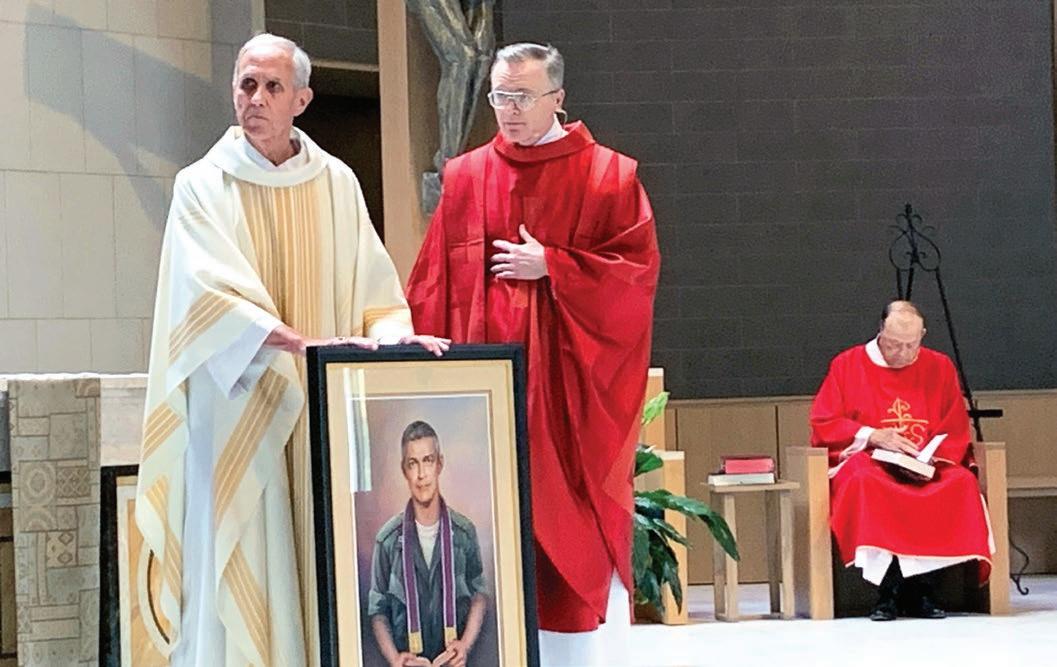
people learn about veteran ministry, about veterans, the more they learn about their neighbor,” said Ann Marie Puck, coordinator of MOM.
Prayer is an important aspect of this ministry. Masses of remembrance for veterans and other prayer services are two ways that military members are acknowledged and appreciated. Similarly, prayer teams offer spiritual support and consolation, and spiritual veteran retreats are often advertised and encouraged.
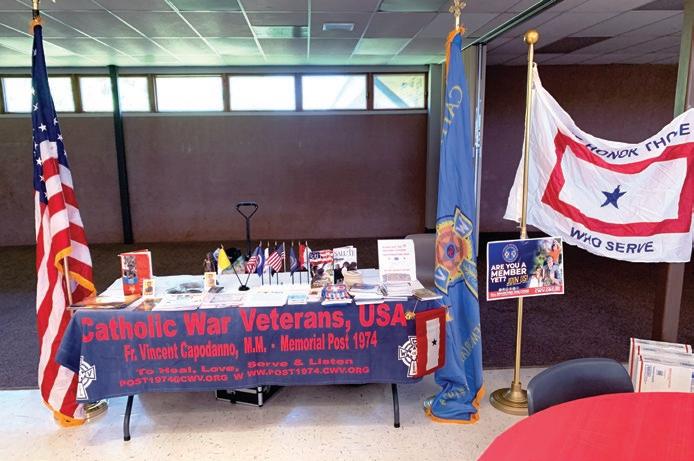
MOM reaches out to military families in times of separation to help alleviate stress. Activities such as changing the oil in their family vehicle or mowing their lawn are practical ways that this ministry provides support to the families. Special efforts are being made to reach out to children who feel the trauma of separation from a deployed parent or loved one. Sending the weekly parish bulletin, handwritten notes and care packages to deployed soldiers lets them know that they are not forgotten and that their family back home has a support system and the resources they need.
To provide resources and professional connections, MOM partners with organizations in the community such as Catholic Charities of Kansas City-St. Joseph. Catholic Charities aids in veteran housing case management, emergency assistance, employment services and oneon-one counseling.
MOM is aligned with the Father Vincent Capodanno Me -
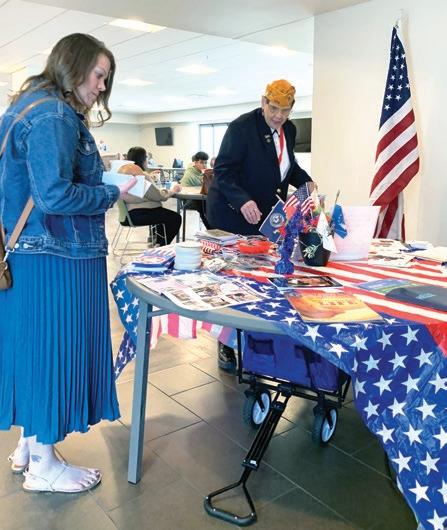
To learn more, contact Ann Puck at annroberts977@gmail.com.
morial Post 1974, the northwest Missouri post of the Catholic War Veterans (CWV). Together, the organization and ministry serve all local military veterans and families, Catholic and non-Catholic, providing the best support and resources possible.
volunteer spotlight
31
‘OPUS DEI’ (WORK OF GOD) is a universal call to holiness
By Marty Denzer
Aspecial Mass will be celebrated June 26 at Our Lady of Good Counsel Church in Kansas City, honoring Saint Josemaria Escriva, the founder of Opus Dei, on his feast day. The celebrant will be Bishop James Johnston of the Diocese of Kansas City-St. Joseph.
Almost a century ago, in 1928, a Spanish priest, Josemaria Escriva, had a vision of “Opus Dei” (Work of God). He “saw” a way for Catholics to learn how to answer the universal call to holiness in Matthew 5:48, “Be you therefore perfect, as your heavenly Father is perfect.”
Father Andrew Mattingly, pastor of Our Lady of Good Counsel Parish, explained, “Our work defines us, and we can reach the fullness of our call to holiness by pursuing the good and practicing true charity in all our actions, particularly in the workplace. To be truly charitable, we must will the good of our co-workers, and for Catholics, the ultimate good is God!”
Opus Dei gained a presence in this diocese about two decades ago, as spirituality of the laity was floundering. Lay holiness has rebounded and today, 98 percent of its members are lay men and women.
Father Steve Hansen, pastor of the Cathedral of St. Joseph in St. Joseph, was instrumental in the growing local devotion to Saint Josemaria Escriva and spirituality. Father Mattingly said priests of the Prelature of the Holy Cross — known as Opus Dei priests — come to Our Lady of Good Counsel monthly to celebrate Recollections. Originally invited by former Bishop Robert Finn, then by Father Hansen, during the past five or six years they have come at the invitation of Bishop Johnston, he said.
The Recollections are mini retreats, lasting about two hours, offering time for personal prayer, adoration and opportunities for Confession. Recollection retreats are held consecutively, one day for men and one for women.
Founded in 1928, Opus Dei was approved by Pope Pius XII as “an institution of pontifical right” in 1950. The future saint worked tirelessly until his death in 1975 to grow the Opus Dei institution. By then, there were about 60,000 members in 80 countries.
Three years after his death, then-Cardinal Albino Luciani (later Pope Saint John Paul I) celebrated the unique innovations of Josemaria Escriva’s contribution to Christian spirituality, and he was canonized in 2002 by Pope Saint John Paul II.

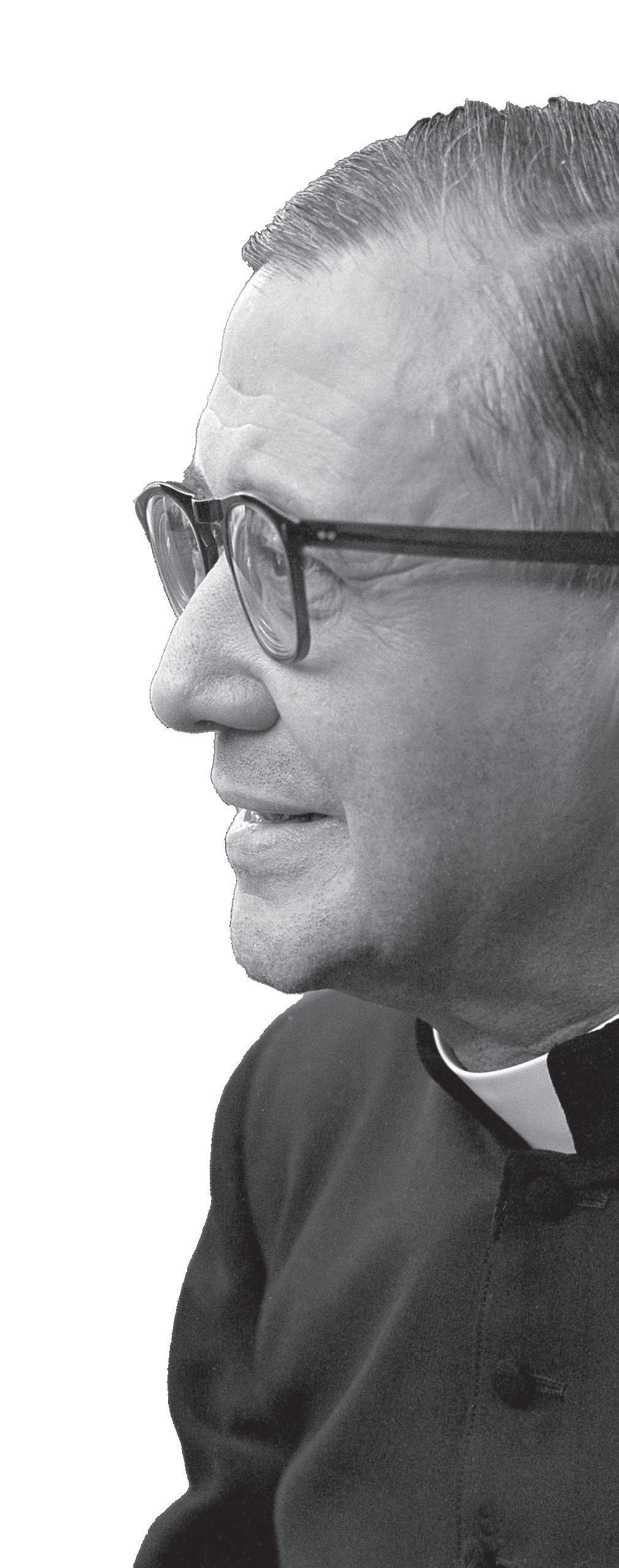
feature Oficina de Información de la Prelatura del Opus Dei en España/ CC BY-SA 4.0/ https://www.flickr.com/photos/opus-dei/6990010951/in/album-72157629242365993/ Catholic Key • June/July 2024 • catholickey.org 32
“POR LO TANTO, SEAN PERFECTOS, COMO LO ES SU PADRE CELESTIAL.”


EL ‘OPUS DEI’ (OBRA DE DIOS) es una llamada universal a la santidad
Por Marty Denzer
El 26 de junio, día de su fiesta, se celebrará una Misa Especial en honor de San Josemaría Escrivá, fundador del Opus Dei , en la Iglesia de Our Lady of Good Counsel en Kansas City. La misa será celebrada por el Obispo James Johnston de la Diócesis de Kansas City — St. Joseph.
Hace casi un siglo, en 1928, un sacerdote español, Josemaría Escrivá, tuvo una visión del “Opus Dei” (El trabajo de Dios). El “vio” una forma para que los católicos aprendan como responder la llamada universal a la santidad en Mateo 5:48. “Por lo tanto, sean perfectos, como lo es su Padre Celestial”
El padre Andrew Mattingly, párroco de Our Lady of Good Counsel, explicó, “Nuestro trabajo nos define, y podemos alcanzar la plenitud de nuestro llamado a la santidad haciendo el bien y practicando la verdadera caridad en todas nuestras acciones, particularmente en nuestro sitio de trabajo. Para ser verdaderamente caritativos, debemos querer el bien de nuestros colaboradores y para los católicos el bien supremo es Dios”.
El “Opus Dei” ganó presencia en esta Diócesis hace unas dos décadas, cuando la espiritualidad de los laicos estaba tambaleándose. La santidad de los laicos ha repuntado y hoy en dia, el 98% de sus miembros son hombres y mujeres laicos.
El padre Steve Hansen, párroco de la Catedral de St. Joseph en St. Joseph, fue un instrumento en el crecimiento de la devoción a San Josemaría Escrivá y la espiritualidad. El padre Mattingly señaló que los sacerdotes de la Prelatura de la Santa Cruz, conocidos como sacerdotes del Opus Dei, vienen mensualmente a Our Lady of Good Counsel a celebrar los Recordatorios. Él dijo que originalmente fueron invitados por el anterior Obispo, Robert Finn, luego por el padre Hansen, y durante los pasados cinco o seis años han venido por invitación del Obispo Johnston.
Los Recordatorios son mini retiros, que duran cerca de dos horas, y ofrecen tiempo para la oración personal, la Adoración y oportunidades para la Confesión. Los retiros de Recordatorio son realizados consecutivamente, un día para hombres y otro para mujeres.
El Opus Dei, fundado en 1928, fue aprobado como “una institución de derecho pontificio” por el papa Pio XII en 1950. El futuro santo trabajo incansablemente hasta su muerte en 1975 para hacer crecer la institución del Opus Dei. Para entonces, existían cerca de 60.000 miembros en 80 países. Tres años después de su muerte, el entonces Cardenal Albino Luciani (posteriormente papa San Juan Pablo I) celebró las innovaciones únicas de las contribuciones de Josemaría Escrivá a la espiritualidad cristiana, y fue canonizado en el 2002 por papa San Juan Pablo II.
artículo de fondo
Rays: Getty Images/Sylfida
33
National Pilgrimage
Bringing Perpetual Pilgrims through our diocese
By Allison Vrooman
THOUSANDS OF FIRST CENTURY
CHRISTIANS
ACCOMPANIED JESUS CHRIST IN HIS EARLY MINISTRY. TODAY, THROUGH THE GIFT OF THE INSTITUTION OF THE EUCHARIST, WE, TOO, CAN WALK ALONGSIDE HIM IN

A NEW WAY.
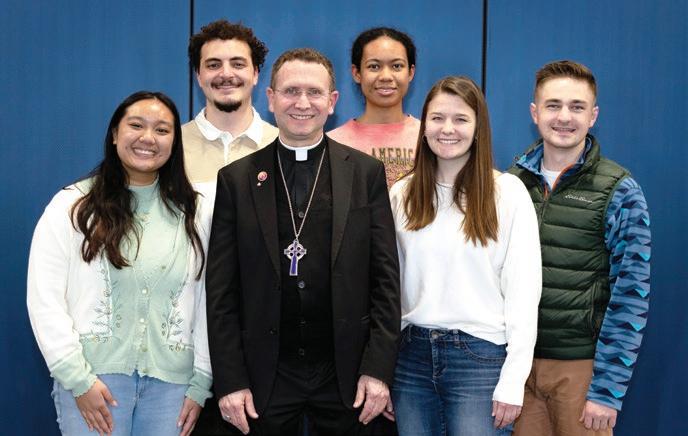
of spreading God’s love to the world. The weeklong event includes opportunities to receive the sacraments; breakout sessions with recognizable Catholic speakers such as Bishop Robert Barron, Sister Miriam James Heidland, Father Mike Schmitz and many more; and time for fellowship with Catholics from around the country.
Named after the “Apostle of California,” the Saint Junipero Serra Route began in San Francisco and is traveling more than 2,200 miles through the Rocky Mountains and Great Plains. A small group of dedicated young adults and a priest, called Perpetual Pilgrims, are physically walking with Jesus on this journey. As they travel, they stop to worship and receive the Lord with communities.
More than just a physical journey to the National Eucharistic Congress, this Pilgrimage is a spiritual journey, drawing everyone who partakes into a deeper, more intentional relationship with the Lord.”
overnight by gracious parishioners of Holy Spirit Catholic Church in Lee’s Summit and will participate in Sunday Mass with the community before heading to Sacred Heart Catholic Church in Warrensburg.
The National Eucharistic Pilgrimage is a unique initiative to bring our Lord to souls across the country. More than just a physical journey to the National Eucharistic Congress, this pilgrimage is a spiritual journey, drawing everyone who partakes into a deeper, more intentional relationship with the Lord. Pilgrims undertake this expedition as both an act of reverence to the
Blessed Sacrament and a bold public display of worship.
In mid-May, four groups departed from opposite sides of the country, each en route to the 10th National Eucharistic Congress in Indianapolis. Taking place July 17-21, the congress is an invitation for Catholics across the United States to gather and experience a profound personal revival, leaving with the task
The pilgrimage will make its way through the Diocese of Kansas City-St. Joseph June 29July 1. First, the pilgrims will partake in adoration, lunch and a service project at St. Monica Catholic Church on Saturday, June 29. They will then process to St. Therese Catholic Church (North) for an evening of Eucharistic adoration put on by Kansas City’s Catholic young adult apostolate, City on a Hill. The journeyers will be hosted
“We're honored to play a small part in this much larger National Revival, which beautifully reminds us to keep our gaze fixed on Christ,” shared Shelby Gambino, community experience director for City on a Hill.
Saint Junipero Serra, pray for us!
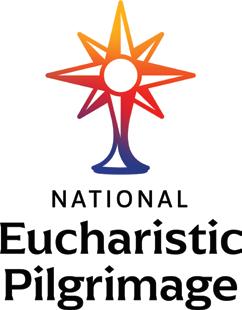
feature
The Perpetual Pilgrims of the National Eucharistic Pilgrimage Serra Route: (front row, L to R) Jaella Mac Au, Bishop Andrew Cuzzins (Diocese of Crookston, Minnesota and chairman of the Bishops Advisory Group for the National Eucharistic Revival) and Madison Michel; and (back row L to R) Patrick Fayad, Chima Adiole and Jack Krebs. Not pictured: Chas Firestone East.
National Eucharistic Revival Catholic Key • June/July 2024 • catholickey.org 34
Kansas City’s ONLY Catholic Home Care & Hospice
Guided
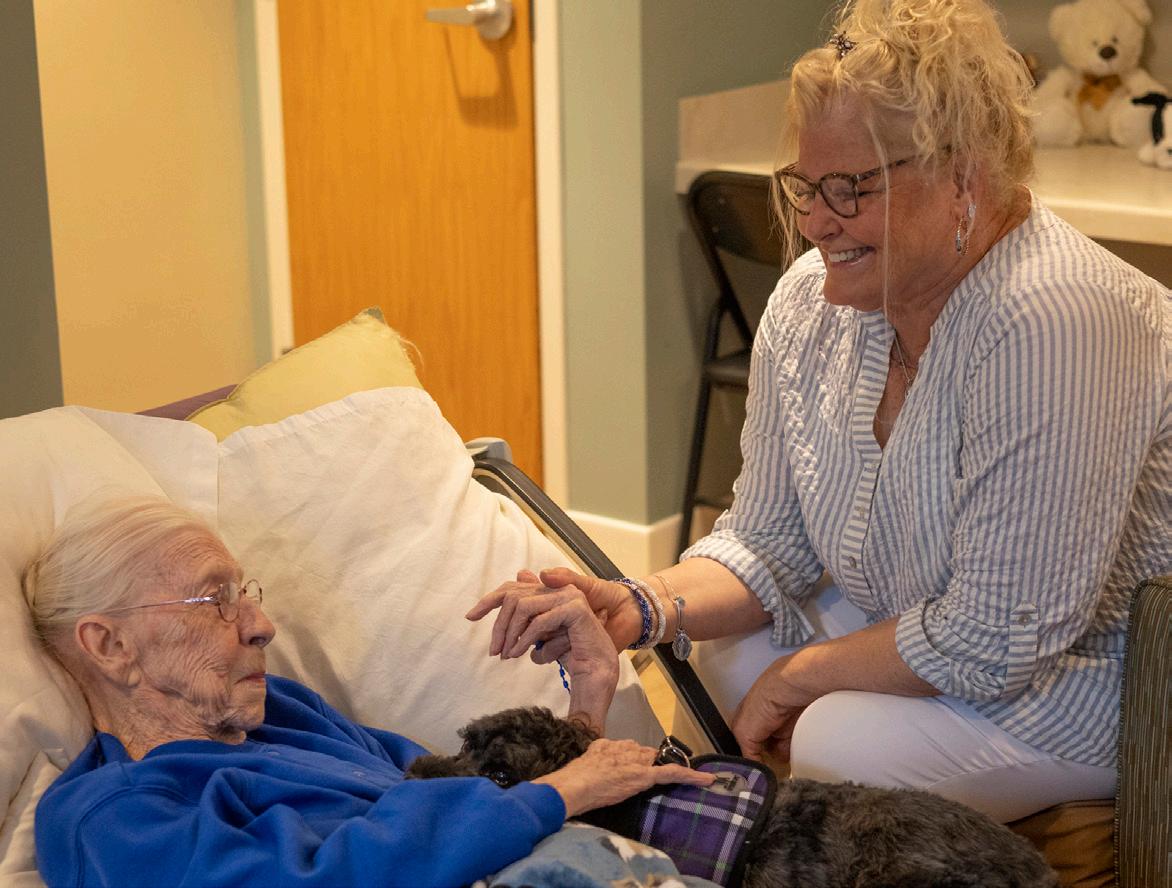


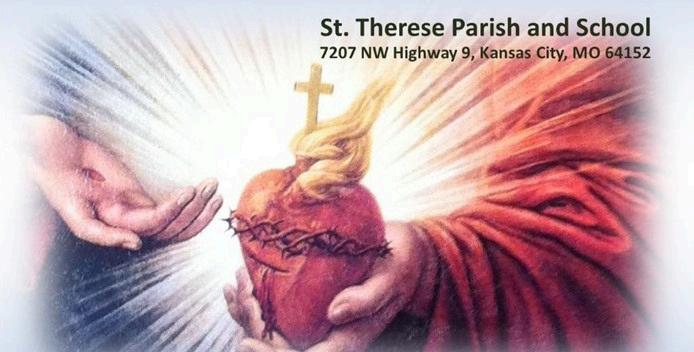
YOU CAN HELP US CARRY OUT CHRIST’S HEALING MISSION
by the Ethical & Religious
for Catholic Healthcare Services, we provide authentically Catholic care for all those in need, regardless of their ability to pay.
a Hospice or Home Care volunteer today! The Diocese of Kansas City-St Joseph and the Archdiocese of Kansas City in Kansas present Kansas City Vocation Day My Vocation is Love August 3, 2024 St. Therese Parish and School 7207 NW Hwy. 9, KCMO 64152 Sessions for young adults, parents and children kcvocationday.com
Directives
Become
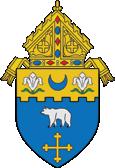

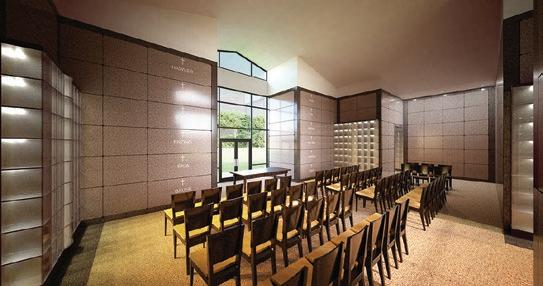
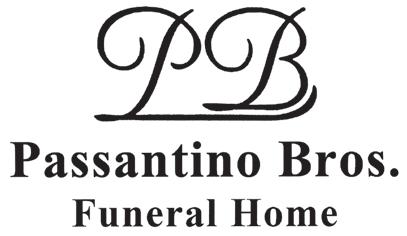
Diocese of Kansas City-St. Joseph The Catholic Center 20 W. Ninth St. Kansas City, MO 64105 Serving Our Catholic Community Since 1954 Family Owned Since 1930 We will begin o ering space in our new mausoleums at Mt. Olivet and Resurrection Cemeteries in Kansas City soon. Special o ers will be published in The Catholic Key and parish bulletins. “Plan Today, Not Tomorrow ~ Together, Not Alone.” Before, During and After... We will be there in your time of need. cemeterieskcsj.org Charlie Passantino 2117 Independence Blvd. Kansas City, MO 64124 (816) 471-2844 www.passantinobros.com Steve Pierce 6800 Troost Ave Kansas City, MO 64131 (816) 444-2060 www.muehlebachchapel.com Mt. Olivet Cemetery - KC 7601 Blue Ridge Blvd. Kansas City, MO 64138 816.353.1900 Mt. St. Mary’s Cemetery 2201 Cleveland Avenue Kansas City, MO 64127 816.241.7663 Resurrection Cemetery 5001 NE Cookingham Dr. Kansas City, MO 64156 816.734.2356 Mt. Olivet CemeterySt. Joseph 26th & Lovers Lane St. Joseph, MO 64506 816.279.5005 ~ This Is A Holy Place~ it is consecrated ground set aside as a meeting place for God and man. Partnering with Catholic Cemeteries are two of Kansas City's most established and trusted funeral homes family operated
































 Marc Cardaronella is the director of the Office of Catechesis and Faith Formation.
Marc Cardaronella is the director of the Office of Catechesis and Faith Formation.

 2022 Corpus Christi procession to Guardian Angels Parish, Kansas City.
2022 Corpus Christi procession to Guardian Angels Parish, Kansas City.

















 By Karen Ridder
By Karen Ridder
























